#humanity by nature might be selfless and help each other but individuals are selfish as I've learnt. I have to get with that to survive.
Text
I think this just solidifies the fact that I can’t trust anyone or anything and I knew already the world was acting against me but the only way to get things fucking done is to do it all yourself. nobody else can be trusted to do anything. if you want something you have to fight tooth and nail uphill to get anywhere.
#I'm not walking anyone's fucking predetermined path they didn't consult me on and based solely on what they want#and despite the fact that's always been forced upon me and I've been aware of it since I was fucking fourteen#stop having interests study all your time away why are you working on that portfolio that genuinely takes hours upon hours to complete#and work on this thing for hours more time than you could actually fucking spend on it because there's not that much content#why don't you do anything they say as you work on something else that needs doing because you aren't doing what they want#I could spend hours sorting things and still be called lazy for not doing something else that wasn't explained to me I have to do#because spoiler alert I do actually need to be told if you want something done. I'm autistic. I don't take clues very well#well. my grandmother only started believing I was autistic like two years ago. and I don't think she understands that#because 'I worked with autistic kids and you're nothing like them' yeah duh this was in the nineties and they were under five years old#I cannot trust a single person to help me and the only way I can do anything is to do it myself#if it takes it I'm going to walk myself and my things to a better place#even if the better place is in the fucking americas or in europe or somewhere else half the world away#humanity by nature might be selfless and help each other but individuals are selfish as I've learnt. I have to get with that to survive.#would've done better had I learnt it sooner and realised I had to learn skills myself. how to cook and clean without instruction.#because I was expected to do that and I was a whiny baby for thinking otherwise.#I'm gonna go clean and if they complain I'll ignore them because they don't care. if it's easier for them to ignore a problem they will
0 notes
Text
Andrew Ryan vs. Robert House
On almost every House post I make, someone in the notes will reliably reference Andrew Ryan. I totally get it - they look similar, they're based on the same guy, the parallels are so clear that the NV dev team added an achievement for killing House with a golf club - but I think these commonalities tend to engulf both characters, blotting out some of their more interesting ideological/personal differences. It's useful to examine them in relation to one another, but part of that is figuring out what distinguishes them, which is just what I’ve attempted to do.
It's difficult for me to talk about Randian objectivism because I don't think it's sound enough to address on its own terms, but considering this is the philosophy Andrew Ryan has adopted, I kind of have to. What I’d identify as the core premise of Randian ethics is this: altruism is a moral wrong. Some Randians have argued that isn't really what they believe - that the real point is anything resembling altruism is self-interest in disguise - but they're departing from the beliefs of their icon when they make those claims. Per Rand:
The irreducible primary of altruism, the basic absolute is self-sacrifice – which means self-immolation, self-abnegation, self-denial, self-destruction – which means the self as a standard of evil, the selfless as a standard of the good.
The way Rand defines altruism is by linking it to self-sacrifice, which she uses to differentiate it from kindness or benevolence. Aiding others at no cost to yourself is benevolent, but not altruistic, and therefore not evil. Sacrificing your happiness to help another human being is, from Rand's perspective, evil, as is any philosophy that prioritizes the other at the cost of the self. This whole idea has been broadly rejected by most scholars on account of it being really fucking stupid. What justifies the leap from "man is naturally selfish" to "selfishness is good"? If selfishness is moral, wouldn't the most moral behavior be to exploit others through whatever means necessary, favoring force over the market? Rand defines happiness as "using your mind’s fullest power," achievable only when you "do not consider the pleasure of others as the goal," but why is this the only definition? What if your only options are self-sacrificial in nature? How do you weigh them if neither sacrifice is linked to values, individual achievement, or "your mind's fullest power" at all? Rand didn't care because she was too busy trying to ethically justify cheating on her man with her best friend's husband, but nonetheless, this is the philosophy Andrew Ryan’s adopted. He claims that "Altruism is the root of all Wickedness," in what's almost a direct quote from Rand herself.
To that end, Ryan builds a system that doesn’t just accept selfishness but actively incentivizes it. Every other principle he expresses is subservient to the ideas that selfishness rules man, and that for Ryan to act on his own selfish impulses is the highest good in the world. His lesser political principles (individual liberties, negative rights, the creation of a stateless society) don’t matter to him as much as the central precept from which they stem: that selfishness is his moral imperative.
What is the greatest lie every created? What is the most vicious obscenity ever perpetrated on mankind? Slavery? The Holocaust? Dictatorship? No. It's the tool with which all that wickedness is built: altruism.
It doesn't come as a particular surprise to me when he starts imprisoning dissidents or executing rivals or banning theft (standard practice in most societies, but not what an egoist would pursue; if you can get away with taking it, you deserve to have it, or so the thinking goes). I’ve seen him described as a hypocrite, but I don’t think that’s necessarily true considering everything he does is in line with his opposition to altruism. He'll adhere to his other principles only if they don’t sabotage his pursuit of personal power. This is evident in the fact that he only adopts a negative perception of Fontaine when his own interests are threatened, but doesn’t give two shits what Fontaine might be doing to sow conflict and harm people before that point. A guy named Gregory asks Ryan to step in against Fontaine early on before Fontaine's fully established himself as a threat to Ryan's power, and Ryan's extremely blase about it.
Don't expect me to punish citizens for showing a little initiative. If you don't like what Fontaine is doing, well, I suggest you find a way to offer a better product.
Contrast this with how he reacts when Fontaine has risen as a genuine business rival. This is from the log titled "Fontaine Must Go."
Something must be done about Fontaine. While I was buying buildings and fish futures, he was cornering the market on genotypes and nucleotide sequences. Rapture is transforming before my eyes. The Great Chain is pulling away from me.
This double standard is the natural outgrowth of his prioritization of self-interest. If your most deeply-held belief is that you should never give up your interests for others, ancillary rules become flexible in times of personal crisis, and Bioshock makes the case that putting someone like that in charge of a city will leave you with a crumbling, monstrous ruin.
Superficially, House has some similarities. Ryan executes political rivals; House has you blow up a bunker of his ideological opponents. Ryan is the highest authority in Rapture; House is the absolute monarch of Vegas. Their goals and moral codes, though, are almost diametrically opposed. When you ask House why you’re expected to trust him when he’s openly admitting to installing himself as the despot of the New Vegas Strip, he says this:
I have no interest in abusing others... Nor have I any interest in being worshipped as some kind of machine-god messiah. I am impervious to such corrupting ambitions.
Most of his resources are devoted to large-scale, impersonal projects, aimed either at building the power of Vegas or securing his long term goal of “progress” as he sees it. He’s rejected selfishness as a moral good because House is very far from Randian objectivism. He's a Hobbesian monarch.
In that respect, he shares an outlook on human nature with Ryan that I deeply disagree with (that human beings are essentially selfish), but in terms of what that means for the structure of a utopian society, House takes a very different position. From his perspective, human nature breeds suffering, not industriousness, and the only way to stamp out conflict - and, in a post-nuclear age, ensure the continued survival of the human race - is through a strong sovereign. The purpose of a state as laid out in Leviathan aligns very, very closely with the one House expresses.
...the foresight of their own preservation, and of a more contented life thereby; that is to say, of getting themselves out from that miserable condition of war which is necessarily consequent, as hath been shown, to the natural passions of men...
The monarch's successes are reflected in his society and the well-being of humanity as a whole. To subvert his goals is to subvert society's goals, and to doom humanity to the war, death, and suffering that exist in a state of nature. When you destroy his Securitrons/kill him, he doesn't plead for himself or get offended on his own behalf. He accuses you of betraying not him, but mankind.
Single-handedly, you've brought mankind's best hopes of forward progress crashing down. No punishment would be too severe.
Fool... to let... personalities... derail future... of mankind? ...Stupid!
Slavery... the future of... mankind? What... have you... done?
An important corollary of this idea which again distinguishes House from Ryan appears in Leviathan’s description of the political/moral responsibility of a monarch to his subjects:
...that great Leviathan, or rather, to speak more reverently, of that mortal god to which we owe, under the immortal God, our peace and defence. For by this authority... he hath the use of so much power that, by terror thereof, he is enabled to form the wills of them all, to peace at home, and mutual aid against their enemies abroad.
Hobbes and House give the monarch virtually unlimited power but match it to the monarch's duty, which he lives to fulfill. His obligation is to speak for the people, act for them, and protect them from all threats, internal and external. House generally abides by this, orienting his decisions around his goals for society irrespective of the personal cost (the negative consequences of his actions are a product of his fucked evaluations of what’s best for society, not personal greed). It’s not just a departure from Ryan’s philosophy but a complete refutation of it. He's almost died for what he's misidentified as the greatest good.
Given that I had to make do with buggy software, the outcome could have been worse. I nearly died as it was…. I spent the next few decades in a veritable coma.
This is not the behavior of an egoist. This is the behavior of an extremely arrogant but marginally altruistic (from a Randian perspective lmao) guy. This is some distorted “from each according to his ability” shit if you’ve managed to convince yourself your abilities exceed those of everyone else who has ever lived and that you can get the Mandate of Heaven by being really good at statistics.
The reason these guys develop such similar structures and hierarchies despite the ideological gulfs between them is because both of them are elitists who’ve experienced a massive failure of self-consciousness. They’re unable to conceive of other people as being fundamentally like them. Ryan separates people into the clearly-delineated classes of “producer” and “parasite,” ignoring the fact that everything he’s ever “produced” was reliant on a huge, coordinated effort between workers, architects, accountants, middlemen, and others, all of whom, in conjunction, contributed more to the realization of his dreams that he ever could have alone. Rather than realizing his own position is more parasitic and reliant on other people’s labor than that of anyone else in Rapture, he adheres to his doctrine of selfishness even when it’s not reflective of reality and is ruining the the lives of an entire city of people. He deludes himself into believing he’s a superman among ants instead of one flawed man who is reliant on the goodwill of others to help him survive, as are we all.
House, too, thinks he’s exceptional. Unlike Ryan, he acknowledges the necessity of the worker to a functioning society, but while he’ll accept his reliance on that labor, he doesn’t trust the laborer enough to share political power. House knows he’s invested in humanity’s survival and the creation of a better world, but he refuses to consider that he might not be alone in this goal. He chalks up the existence of the Legion to fanaticism/the ambitions of a sultanistic dictator and attributes everything the NCR has done to greed, without it ever occurring to him that the massive harm these nations have done was partially motivated by the same goals he’s devoted himself to - and that the atrocities he’s committed since his rise to power are, in some respects, very similar. House knows himself to be invested in the well-being of humanity, but he’s too arrogant to ask himself if his methods are wrong or trust other people to build a new path, one that doesn’t necessitate his complete control over the land and people of the Mojave. Ryan and House’s worldviews are distinct, and their flaws, as highlighted by their respective narratives, say some interesting things about how each set of devs view power and the pitfalls of elitism.
Anyway. If you put these two men in a room, they would probably try to murder each other, and I think that’s great.
107 notes
·
View notes
Text
SHADOW WORK: The Ultimate Guide
I. Why Focusing Only on the Light is a Form of Escapism
For most of my life, I’ve grown up firmly believing that the only thing worthy of guiding me was “light” and “love.” Whether through the family environment I was raised in, or the cultural myths I was brought up clinging to, I once believed that all you really needed to do in life to be happy was to focus on everything beautiful, positive and spiritually “righteous.” I’m sure you were raised believing a similar story as well. It’s a sort of “Recipe for Well-Being.”
But a few years ago, after battling ongoing mental health issues, I realized something shocking:
I was wrong.
Not just wrong, but completely and utterly off the mark. Focusing only on “love and light” will not heal your wounds on a deep level. In fact, I’ve learned through a lot of heavy inner work, that not only is focusing solely on “holiness” in life one side of the equation, but it is actually a form of spiritually bypassing your deeper, darker problems that, let me assure you, almost definitely exist.
It is very easy and comfortable to focus only on the light side of life. So many people in today’s world follow this path. And while it might provide some temporary emotional support, it doesn’t reach to the depths of your being: it doesn’t transform you at a core level. Instead, it leaves you superficially hanging onto warm and fuzzy platitudes which sound nice, but don’t enact any real change.
What DOES touch the very depths of your being, however, is exploring your Shadow.
II. What is the Human Shadow?
In short, the human shadow is our dark side; our lost and forgotten disowned self.
Your shadow is the place within you that contains all of your secrets, repressed feelings, primitive impulses, and parts deemed “unacceptable,” shameful, “sinful” or even “evil.”
This dark place lurking within your unconscious mind also contains suppressed and rejected emotions such as rage, jealousy, hatred, greed, deceitfulness, and selfishness.
So where did the Shadow Self idea originate? The concept was originally coined and explored by Swiss psychiatrist and psychoanalyst, Carl Jung. In Jung’s own words:
“Everyone carries a shadow, and the less it is embodied in the individual’s conscious life, the blacker and denser it is.”
When the human Shadow is shunned, it tends to undermine and sabotage our lives. Addictions, low self-esteem, mental illness, chronic illnesses, and various neuroses are all attributed to the Shadow Self. When our Shadows are suppressed or repressed in the unconscious long enough, they can even overtake our entire lives and causes psychosis or extreme forms of behavior like cheating on one’s partner or physically harming others. Intoxicants such as alcohol and drugs also have a tendency to unleash the Shadow.
Thankfully, there is a way to explore the Shadow and prevent it from devouring our existence, and that is called Shadow Work.
III. What is Shadow Work?
Shadow work is the process of exploring your inner darkness or “Shadow Self.” As mentioned previously, your Shadow Self is part of your unconscious mind and contains everything you feel ashamed of thinking and feeling, as well as every impulse, repressed idea, desire, fear, and perversion that for one reason or another, you have “locked away” consciously or unconsciously. Often this is done as a way of keeping yourself tame, likable, and “civilized” in the eyes of others.
Shadow work is the attempt to uncover everything that we have hidden and every part of us that has been disowned and rejected within our Shadow Selves.
Why? Because without revealing to ourselves what we have hidden, we remain burdened with problems such as anger, guilt, shame, disgust, and grief.
All throughout the history of mankind Shadow Work has played a powerful yet mysterious and occult role in helping us discover what is causing us mental illness, physical dis-ease and even insanity resulting in crimes of all kinds.
Traditionally, Shadow Work fell in the realm of the Shamans, or medicine people, as well as the priests and priestesses of the archaic periods of history. These days, Shadow Work falls more commonly in the realms of psychotherapy, with psychologists, psychiatrists, spiritual guides, and therapists.
IV. Do We All Have a Shadow Self?
Yes, we ALL have a Shadow Self.
As uncomfortable as it may sound, there is a dark side within every human being. Why is this the case? The reason why all human beings have a shadow is due to the way we were raised as human beings, often referred to as our ‘conditioning.’
“But I’m a good person! I don’t have a ‘shadow’ side,” you might be thinking. Well, the reality is that yes, you might be a good person. In fact, you might be the most generous, loving, and selfless person in the entire world. You might feed the hungry, save puppies, and donate half of your salary to the poor. But that doesn’t exclude you from having a Shadow.
There are no exceptions here.
The nature of being human is to possess both a light and a dark side, and we need to embrace that.
Sometimes, when people hear that they have a Shadow side (or when it is pointed out), there is a lot of denial. We have been taught to perceive ourselves in a very two-dimensional and limited way. We have been taught that only criminals, murderers, and thieves have a Shadow side.
This black and white thinking is one of the major causes of our suffering.
If the thought of having a Shadow side disturbs you, take a moment to consider whether you have developed an idealized self.
Signs of an idealized self include attitudes such as:
· “I’m not like those people, I’m better.”
· “I have never strayed.”
· “God is proud of me.”
· “Criminals and wrongdoers aren’t human.”
· “Everyone sees how good I am (even so, I have to remind them).”
· “I’m a role model.”
· “I should be validated and applauded for my good deeds.”
· “I don’t have bad thoughts, so why do others?”
Such perceptions about oneself are unrealistic, unhealthy, and largely delusional. The only way to find inner peace, happiness, authentic love, self-fulfillment, and Illumination is to explore our Shadow.
V. How is Our Shadow Side Formed?
Your Shadow side is formed in childhood and is both (a) a product of natural ego development, and (b) a product of conditioning or socialization. Socialization is the process of learning to behave in a way that is acceptable to society.
When we are born, we are are all full of potential, with the ability to survive and develop in a variety of ways. As time goes on, we learn more and more to become a certain type of person. Slowly, due to our circumstances and preferences, we begin to adopt certain character traits and reject others. For example, if we are born into a family that shows little interpersonal warmth, we will develop personality traits that make us self-sufficient and perhaps standoffish or mind-oriented. If we are born into a family that rewards compliance and shuns rebellion, we will learn that being submissive works, and thus adopt that as part of our ego structure.
As authors and Jungian therapists, Steve Price and David Haynes write:
“But, as we develop our ego-personality, we also do something else at the same time. What has happened to all those parts of our original potential that we didn’t develop? They won’t just cease to exist: they will still be there, as potential or as partly developed, then rejected, personality attributes, and they will live on in the unconscious as an alternative to the waking ego. So, by the very act of creating a specifically delineated ego-personality, we have also created its opposite in the unconscious. This is the shadow. Everyone has one.”
As we can see, developing the Shadow Self is a natural part of development.
But you also formed an alter ego due to social conditioning, i.e. your parents, family members, teachers, friends, and society at large all contributed to your Shadow.
How?
Well here’s the thing: polite society operates under certain rules. In other words, certain behaviors and characteristics are approved of, while others are shunned. Take anger for example. Anger is an emotion that is commonly punished while growing up. Throwing tantrums, swearing, and destroying things was frowned upon by our parents and teachers. Therefore, many of us learned that expressing anger was not “OK.” Instead of being taught healthy ways to express our anger, we were punished sometimes physically (with smacks or being grounded), and often emotionally (withdrawal of love and affection).
There are countless behaviors, emotions, and beliefs that are rejected in society, and thus, are rejected by ourselves. In order to fit in, be accepted, approved, and loved, we learned to act a certain way. We adopted a role that would ensure our mental, emotional, and physical survival. But at the same time, wearing a mask has consequences. What happened to all the authentic, wild, socially taboo, or challenging parts of ourselves? They were trapped in the Shadow.
What happens as we grow up?
Through time, we learn to both enjoy, and despise, our socially-approved egos because, on the one hand, they make us feel good and “lovable,” but on the other hand, they feel phony and inhibited.
Therapist Steve Wolf has a perfect analogy that describes this process:
“Each of us is like Dorian Gray. We seek to present a beautiful, innocent face to the world; a kind, courteous demeanor; a youthful, intelligent image. And so, unknowingly but inevitably, we push away those qualities that do not fit the image, that does not enhance our self-esteem and make us stand proud but, instead, bring us shame and make us feel small. We shove into the dark cavern of the unconscious those feelings that make us uneasy — hatred, rage, jealousy, greed, competition, lust, shame — and those behaviors that are deemed wrong by the culture — addiction, laziness, aggression, dependency — thereby creating what could be called shadow content. Like Dorian’s painting, these qualities ultimately take on a life of their own, forming an invisible twin that lives just behind our life, or just beside it …”
But while the Shadow Self may be portrayed as our “evil twin,” it is not entirely full of “bad” stuff. There is actually gold to be found within the Shadow.
VI. What is the Golden Shadow?
Jung once states that “the shadow is ninety percent pure gold.” What this means is that there are many beautiful gifts offered to us by our Shadow side if we take the time to look. For example, so much of our creative potential is submerged within our darkness because we were taught when little to reject it.
Not everything within our Shadow is doom and gloom. In fact, the Shadow contains some of our most powerful gifts and talents, such as our artistic, sexual, competitive, innovative, and even intuitive aptitudes.
The ‘Golden Shadow’ also presents us with the opportunity for tremendous psychological and spiritual growth. By doing Shadow Work, we learn that every single emotion and wound that we possess has a gift to share with us. Even the most obnoxious, “ugly,” or shameful parts of ourselves provide a path back to Oneness. Such is the power of the Shadow – it is both a terrifying journey, but is ultimately a path to Enlightenment or Illumination. Every spiritual path needs Shadow Work to prevent the issues from happening that we’ll explore next.
VII. What Happens When You Reject Your Shadow?
When shadow-work is neglected, the soul feels dry, brittle, like an empty vessel. — S. Wolf
Rejecting, suppressing, denying, or disowning your Shadow, whether consciously or unconsciously, is a dangerous thing. The thing about the Shadow Self is that it seeks to be known. It yearns to be understood, explored, and integrated. It craves to be held in awareness. The longer the Shadow stays buried and locked in its jail cell deep within the unconscious, the more it will find opportunities to make you aware of its existence.
Both religion and modern spirituality tend to focus on the “love and light” aspects of spiritual growth to their own doom.
This over-emphasis on the fluffy, transcendental, and feel-good elements of a spiritual awakening results in shallowness and phobia of whatever is too real, earthy, or dark.
Spiritually bypassing one’s inner darkness results in a whole range of serious issues. Some of the most common and reoccurring Shadow issues that appear in the spiritual/religious community include pedophilia among priests, financial manipulation of followers among gurus, and of course, megalomania, narcissism, and God complexes among spiritual teachers.
Other issues that arise when we reject our Shadow side can include:
· Hypocrisy (believing and supporting one thing, but doing the other)
· Lies and self-deceit (both towards oneself and others)
· Uncontrollable bursts of rage/anger
· Emotional and mental manipulation of others
· Greed and addictions
· Phobias and obsessive compulsions
· Racist, sexist, homophobic, and other offensive behavior
· Intense anxiety
· Chronic psychosomatic illness
· Depression (which can turn into suicidal tendencies)
· Sexual perversion
· Narcissistically inflated ego
· Chaotic relationships with others
· Self-loathing
· Self-absorption
· Self-sabotage
… and many others. This is by no means a comprehensive list (and there are likely many other issues out there). As we’ll learn next, one of the greatest ways we reject our Shadow is through psychological projection.
VIII. The Shadow and Projection (a Dangerous Mix)
One of the biggest forms of Shadow rejection is something called projection.
Projection is a term that refers to seeing things in others that are actually within ourselves.
When we pair projection and the Shadow Self together, we have a dangerous mix. Why? Because as psychotherapist Robert A. Johnson writes:
“We generally seek to punish that which reminds us most uncomfortable about the part of ourselves that we have not come to terms with, and we often ‘see’ these disowned qualities in the world around us.”
There are many different ways we ‘punish’ those who are mirrors of our Shadow qualities. We may criticize, reject, hate, dehumanize, or even in extreme cases, physically or psychologically seek to destroy them (think of countries who go at war with the “enemies”). None of us are innocent in this area. We have ALL projected parts of our rejected self onto others. In fact, Shadow projection is a major cause of relationship dysfunction and break down.
If we are seeking to bring peace, love, and meaning to our lives, we absolutely MUST reclaim these projections. Through Shadow Work, we can explore exactly what we have disowned.
IX. Twelve Benefits of Shadow Work
Firstly, I want to say that I have the highest respect for Shadow Work. It is the single most important path I’ve taken to uncover my core wounds, core beliefs, traumas, and projections. I have also observed how Shadow Work has helped to create profound clarity, understanding, harmony, acceptance, release, and inner peace in the lives of others. It is truly deep work that makes changes on the Soul level targeting the very roots of our issues, not just the superficial symptoms.
There is SO much to be gained from making Shadow Work a part of your life, and daily routine. Here are some of the most commonly experienced benefits:
1. Deeper love and acceptance of yourself
2. Better relationships with others, including your partner and children
3. More confidence to be your authentic self
4. More mental, emotional, and spiritual clarity
5. Increased compassion/understanding for others = who you dislike
6. Enhanced creativity
7. Discovery of hidden gifts and talents
8. Deepened understanding of your passions and ultimate life purpose
9. Improved physical and mental health
10. More courage to face the unknown and truly live life
11. Access to your Soul or Higher Self
12. A feeling of Wholeness
It’s important to remember that there are no quick fixes in Shadow Work, so these life-changing benefits don’t just happen overnight. But with persistence, they will eventually emerge and bless your life.
X. Seven Tips for Approaching Shadow Work
Before you begin Shadow Work, you need to assess whether you’re ready to embark on this journey. Not everyone is prepared for this deep work, and that’s fine. We’re all at different stages. So pay attention to the following questions and try to answer them honestly:
· Have you practiced self-love yet?
o If not, Shadow Work will be too overwhelming for you. I have starred this bullet point because it is essential for you to consider. Shadow Work should not be attempted by those who have poor self-worth or struggle with self-loathing. In other words: if you struggle with severely low self-esteem, please do not attempt Shadow Work. I emphatically warn you against doing it. Why? If you struggle with extremely poor self-worth, exploring your Shadow will likely make you feel ten times worse about yourself. Before you walk this path, you absolutely must establish a strong and healthy self-image. No, you don’t have to think you’re God’s gift to the world, but having average self-worth is important. Try taking this self-esteem test to explore whether you’re ready (but first, don’t forget to finish this article!).
· Are you prepared to make time?
o Shadow Work is not a lukewarm practice. You are either all in or all out. Yes, it is important to take a break from it from time to time. But Shadow Work requires dedication, self-discipline, and persistence. Are you willing to intentionally carve out time each day to dedicate to it? Even just ten minutes a day is a good start.
· Are you looking to be validated or to find the truth?
o As you probably know by now, Shadow Work isn’t about making you feel special. It isn’t like typical spiritual paths that are focused on the feel-good. No, Shadow Work can be brutal and extremely confronting. This is a path for truth seekers, not those who are seeking to be validated.
· Seek to enter a calm and neutral space.
o It is important to try and relax when doing Shadow Work. Stress and judgmental or critical attitudes will inhibit the process. So please try to incorporate a calming meditation or mindfulness technique into whatever you do.
· Understand that you are not your thoughts.
o You need to realize that you are not your thoughts for Shadow Work to be healing and liberating. Only from your calm and quiet Center (also known as your Soul) can you truly be aware of your Shadow aspects. By holding them in awareness, you will see them clearly for what they are, and realize that they ultimately don’t define you; they are simply rising and falling mental phenomena.
· Practice self-compassion.
o It is of paramount importance to incorporate compassion and self-acceptance into your Shadow Work practice. Without showing love and understanding to yourself, it is easy for Shadow Work to backfire and make you feel terrible. So focus on generating self-love and compassion, and you will be able to release any shame and embrace your humanity.
· Record everything you find.
o Keep a written journal or personal diary in which you write down, or draw, your discoveries. Recording your dreams, observations, and analysis will help you to learn and grow more effectively. You’ll also be able to keep track of your process and make important connections.
XI. How to Practice Shadow Work
There are many Shadow Work techniques and exercises out there. In this guide, I will provide a few to help you start off. I’ll also share a few examples from my own life:
1. Pay attention to your emotional reactions
In this practice, you’ll learn that what you give power to has power over you. Let me explain:
One Shadow Work practice I enjoy a great deal is paying attention to everything that shocks, disturbs, and secretly thrills me. Essentially, this practice is about finding out what I’ve given the power to in my life unconsciously, because: what we place importance in – whether good or bad – says a lot about us.
The reality is that what we react to, or what makes us angry and distressed, reveals extremely important information to us about ourselves.
For example, by following where my “demons” have taken me – whether in social media, family circles, workspaces, and public places – I have discovered two important things about myself. The first one is that I’m a control freak; I hate feeling vulnerable, powerless and weak . . . it quite simply scares the living hell out of me. How did I discover this? Through my intense dislike of witnessing rape scenes in movies and TV shows, my negative reaction to novel experiences (e.g. roller coaster rides, public speaking, etc.), as well as my discomfort surrounding sharing information about my life with others in conversations. Also, by following where my “demons” have guided me I’ve discovered that I’m being burdened by an exasperating guilt complex that I developed through my religious upbringing. Apart of me wants to feel unworthy because that is what I’ve developed a habit of feeling since childhood (e.g. “You’re a sinner,” “It’s your fault Jesus was crucified”), and therefore, that is what I secretly feel comfortable with feeling: unworthy. So my mind nit-picks anything I might have done “wrong,” and I’m left with the feeling of being “bad” – which I’m used to, but nevertheless, this is destructive for my well-being.
Thanks to this practice, I have welcomed more compassion, mindfulness, and forgiveness into my life.
Paying attention to your emotional reactions can help you to discover exactly how your core wounds are affecting you on a daily basis.
How to Pay Attention to Your Emotional Reactions
To effectively pay attention to your emotional reactions (I call it “following the trail of your inner demons”), you first need to cultivate:
1. Self-awareness
Without being conscious of what you’re doing, thinking, feeling, and saying, you won’t progress very far.
If, however, you are fairly certain that you’re self-aware (or enough to start the process), you will then need to:
2. Adopt an open mindset
You will need to have the courage and willingness to observe EVERYTHING uncomfortable you place importance in, and ask “why?” What do I mean by the phrase “placing importance in”? By this, I mean that, whatever riles, shocks, infuriates, disturbs and terrifies you, you must pay attention to. Closely.
Likely, you will discover patterns constantly emerging in your life. For example, you might be outraged or embarrassed every time sex appears in a TV show or movie you like (possibly revealing sexual repression or mistaken beliefs about sex that you’ve adopted throughout life). Or you might be terrified of seeing death or dead people (possibly revealing your resistance to the nature of life or childhood trauma). Or you might be disgusted by alternative political, sexual, and spiritual lifestyles (possibly revealing your hidden desire to do the same).
There are so many possibilities out there, and I encourage you to go slowly, take your time, and one by one pick through what you place importance in.
“But I DON’T place importance in gross, bad or disturbing things in life, how could I? I don’t care for them!” you might be asking.
Well, think for a moment. If you didn’t place so much importance on what makes you angry, disgusted or upset . . . why would you be reacting to it so much? The moment you emotionally react to something is the moment you have given that thing power over you. Only that which doesn’t stir up emotions in us is not important to us.
See what you respond to and listen to what your Shadow is trying to teach you.
2. Artistically Express Your Shadow Self
Art is the highest form of self-expression and is also a great way to allow your Shadow to manifest itself. Psychologists often use art therapy as a way to help patients explore their inner selves.
Start by allowing yourself to feel (or drawing on any existing) dark emotions. Choose an art medium that calls to you such as pen and pencil, watercolor, crayon, acrylic paint, scrapbooking, sculpting, etc. and draw what you feel. You don’t need to consider yourself an ‘artist’ to benefit from this activity. You don’t even need to plan what you’ll create. Just let your hands, pen, pencil, or paintbrush do the talking. The more spontaneous, the better. Artistic expression can reveal a lot about your obscure darker half. Psychologist Carl Jung (who conceptualized the Shadow Self idea) was even famous for using mandalas in his therapy sessions.
3. Start a Project
The act of creation can be intensely frustrating and can give birth to some of your darker elements such as impatience, anger, blood-thirsty competitiveness, and self-doubt. At the same time, starting a project also allows you to experience feelings of fulfillment and joy.
If you don’t already have a personal project that you’re undertaking (such as building something, writing a book, composing music, mastering a new skill), find something you would love to start doing. Using self-awareness and self-exploration during the process of creation, you will be able to reap deeper insights into your darkness. Ask yourself constantly, “What am I feeling and why?” Notice the strong emotions that arise during the act of creation, both good and bad. You will likely be surprised by what you find!
For example, as a person who considers myself non-competitive, that assumption has been challenged by the act of writing this blog. Thanks to this project, the Shadow within me of ruthless competitiveness has shown its face, allowing me to understand myself more deeply.
4. Write a Story or Keep a Shadow Journal
Goethe’s story Faust is, in my opinion, one of the best works featuring the meeting of an ego and his Shadow Self. His story details the life of a Professor who becomes so separated and overwhelmed by his Shadow that he comes to the verge of suicide, only to realize that the redemption of the ego is solely possible if the Shadow is redeemed at the same time.
Write a story where you project your Shadow elements onto the characters – this is a great way to learn more about your inner darkness. If stories aren’t your thing, keeping a journal or diary every day can shine a light on the darker elements of your nature. Reading through your dark thoughts and emotions can help you to recover the balance you need in life by accepting both light and dark emotions within you.
5. Explore Your Shadow Archetypes
We have several Shadow varieties, also called Shadow Archetypes. These archetypes are sometimes defined as:
· The Sorcerer/Alchemist
· The Dictator
· The Victim
· The Shadow Witch
· The Addict
· The Idiot
· The Trickster
· The Destroyer
· The Slave
· The Shadow Mother
· The Hag
· �� The Hermit
However, I have my own Shadow Archetype classification, which I will include below.
13 Shadow Archetypes
Here are my thirteen classifications which are based on my own self-observations and analysis of others:
1. The Egotistical Shadow
This Shadow Archetype displays the following characteristics: arrogance, egocentricity, pompousness, inconsiderateness, self-indulgence, narcissism, excessive pride.
2. The Neurotic Shadow
This Shadow Archetype displays the following characteristics: paranoia, obsessiveness, suspiciousness, finicky, demanding, compulsive behavior.
3. The Untrustworthy Shadow
This Shadow Archetype displays the following characteristics: secretive, impulsive, frivolous, irresponsible, deceitful, unreliable.
4. The Emotionally Unstable Shadow
This Shadow Archetype displays the following characteristics: moody, melodramatic, weepy, overemotional, impulsive, changeable.
5. The Controlling Shadow
This Shadow Archetype displays the following characteristics: suspicious, jealous, possessive, bossy, obsessive.
6. The Cynical Shadow
This Shadow Archetype displays the following characteristics: negative, overcritical, patronizing, resentful, cantankerous.
7. The Wrathful Shadow
This Shadow Archetype displays the following characteristics: ruthless, vengeful, bitchy, quick-tempered, quarrelsome.
8. The Rigid Shadow
This Shadow Archetype displays the following characteristics: uptight, intolerant, racist, sexist, ableist, homophobic, obstinate, uncompromising, inflexible, narrow-minded.
9. The Glib Shadow
This Shadow Archetype displays the following characteristics: superficial, cunning, inconsistent, sly, crafty.
10. The Cold Shadow
This Shadow Archetype displays the following characteristics: emotionally detached, distant, indifferent, uncaring, unexcited.
11. The Perverted Shadow
This Shadow Archetype displays the following characteristics: masochistic, lewd, sadistic, vulgar, libidinous.
12. The Cowardly Shadow
This Shadow Archetype displays the following characteristics: weak-willed, passive, timid, fearful.
13. The Immature Shadow
This Shadow Archetype displays the following characteristics: puerile, childish, illogical, simpleminded, vacuous.
Keep in mind that the above Shadow Archetypes are by no means exhaustive. I’m sure that there are many others out there which I have missed. But you are free to use this breakdown to help you explore your own Shadows. You’re also welcome to add to this list or create your own Shadow Archetypes, which I highly encourage. For example, you might possess a judgmental and dogmatic Shadow who you call “The Nun,” or a sexually deviant Shadow who you call “The Deviant.” Play around with some words and labels, and see what suits your Shadows the best.
6. Have an Inner Conversation
Also known as “Inner Dialogue,” or as Carl Jung phrased it, “Active Imagination,” having a conversation with your Shadow is an easy way to learn from it.
I understand if you might feel a twinge of skepticism towards this practice right now. After all, we are taught that “only crazy people talk to themselves.” But inner dialogue is regularly used in psychotherapy as a way to help people communicate with the various subpersonalities that they have – and we all possess various faces and sides of our ego.
One easy way to practice inner dialogue is to sit in a quiet place, close your eyes, and tune into the present moment. Then, think of a question you would like to ask your Shadow, and silently speak it within your mind. Wait a few moments and see if you ‘hear’ or ‘see’ an answer. Record anything that arises and reflect on it. It is even possible to carry on a conversation with your Shadow using this method. Just ensure that you have an open mindset. In other words, don’t try to control what is being said, just let it flow naturally. You will likely be surprised by the answers you receive!
Visualization is another helpful way of engaging in inner dialogue. I recommend bringing to mind images of dark forests, caves, holes in the ground, or the ocean as these all represent the unconscious mind. Always ensure that you enter and exit your visualization in the same manner, e.g. if you are walking down a path, make sure you walk back up the path. Or if you open a particular door, make sure you open the same door when returning back to normal consciousness. This practice will help to draw you effortlessly in and out of visualizations.
7. Use the Mirror Technique
As we have learned, projection is a technique of the Shadow that helps us to avoid what we have disowned. However, we don’t only project the deeper and darker aspects of ourselves onto others, we also project our light and positive attributes as well. For example, a person may be attracted to another who displays fierce self-assertiveness, not realizing that this quality is what they long to reunite with inside themselves. Another common example (this time negative) is judgmentalism. How many times have you heard someone say “he/she is so judgmental!” Ironically, the very person saying this doesn’t realize that calling another person ‘judgmental’ is actually pronouncing a judgment against them and revealing their own judgmental nature.
The Mirror Technique is the process of uncovering our projections. To practice this technique, we must adopt a mindful and honest approach towards the world: we need to be prepared to own that which we have disowned! Being radically truthful with ourselves can be difficult, so it does require practice. But essentially, we must adopt the mindset that other people are our mirrors. We must understand that those around us serve as the perfect canvas onto which we project all of our unconscious desires and fears.
Start this practice by examining your thoughts and feelings about those you come in contact with. Pay attention to moments when you’re emotionally triggered and ask yourself “am I projecting anything?” Remember: it is also possible to project our own qualities onto another person who really does possess the qualities. Psychologists sometimes refer to this as “projecting onto reality.” For example, we might project our rage onto another person who is, in fact, a rage-filled person. Or we might project our jealousy onto another who genuinely is jealous.
Ask yourself, “What is mine, what is theirs, and what is both of ours?” Not every triggering situation reveals a projection, but they more than often do. Also, look for things you love and adore about others, and uncover the hidden projections there.
The Mirror Technique will help you to shed a lot of light onto Shadow qualities that you have rejected, suppressed, repressed, or disowned. On a side note, you might also like to read about a similar practice called mirror work which helps you to come face-to-face with your own denied aspects.
XII. Shadow Work Q&A
Here are some commonly asked questions about shadow work:
What is shadow work?
Shadow work is the psychological and spiritual practice of exploring our dark side or the ‘shadowy’ part of our nature. We all possess a place within us that contains our secrets, repressed feelings, shameful memories, impulses, and parts that are deemed “unacceptable” and “ugly.” This is our dark side or shadow self – and it is often symbolized as a monster, devil, or ferocious wild animal.
How to do shadow work?
There are many ways to practice shadow work. Some of the most powerful and effective techniques include journaling, artistically expressing your dark side (also known as art therapy), using a mirror to connect with this part of you (mirror work), guided meditations, exploring your projections, and examining your shadow archetypes.
What is the spiritual shadow?
There is light and darkness within all areas of life, and spirituality is not exempt. The spiritual shadow is what occurs when we fall into the traps of spiritual materialism – a phenomenon where we use spirituality to boost our egos and become arrogant, self-absorbed, and even narcissistic.
XIII. Shadow Self -Test
https://lonerwolf.com/shadow-self-test/
As passionate proponents of Shadow Work, we have created a free Shadow Self test on this website for you to take. Like any test, take it with a grain of salt and use your own analysis to ultimately determine how ‘dominant’ your Shadow is in your life. Please remember that tests online cannot be 100% accurate, so see it as a fun self-discovery tool. And note: those who receive a “small Shadow Self” answer still need to do Shadow Work. No person is exempt. ;)
XIV. Own Your Shadow and You Will Own Your Life
If you are looking for some serious, authentic and long-lived healing in your life, Shadow Work is the perfect way to experience profound inner transformation. Remember that what you internalize is almost always externalized in one form or another.
Own your shadow and you will own your life.
Here are some final inspiring words:
“The secret is out: all of us, no exceptions, have qualities we won’t let anyone see, including ourselves – our Shadow. If we face up to our dark side, our life can be energized. If not, there is the devil to pay. This is one of life’s most urgent projects. — Larry Dossey (Healing Words)”
“If we don’t change, we don’t grow. If we don’t grow, we are not really living. Growth demands a temporary surrender of security.” — Gail Sheehy
“Who has not at one time or another felt a sourness, wrath, selfishness, envy and pride, which he could not tell what to do with, or how to bear, rising up in him without his consent, casting a blackness over all his thoughts … It is exceeding good and beneficial to us to discover this dark, disordered fire of our soul; because when rightly known and rightly dealt with, it can as well be made the foundation of heaven as it is of hell. — William Law”
“To confront a person with his own shadow is to show him his own light. — Carl Jung”
#shadow work#shadow worker#shadowwork#shadowworking#shadow working#carl jung#jungean#carljung#light work#guide#how to do shadow work#how to be a shadow worker#shadow workers#healing#self healing#witch#witch shadow work#your shadow#shadow self#ego#self#self care#self taught#life#better living#holisitic
189 notes
·
View notes
Text
Twice: Death of a Good Man
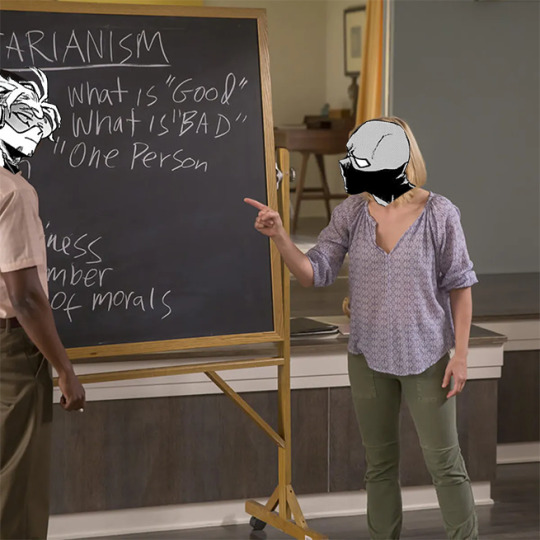
What is good?
What is bad?
What is the worth of one life?
That’s the question asked by the decision that Hawks makes to target twice. This post will look at the moral philosophies that overlap with those deicisions. @waxwingedhawks made a similiar post which you should check out, and while we might overlap I’ll be discussing different material. However the gist of this post is, even if Hawks decision was to prevent the deaths of thousands then is it worth it to kill a good man like Twice?
1. Should the Batman Kill Joker?
Slides taken from this powerpoint: [Source.]
There’s one famous example of ethics in hero comics that relates to this very issue of Hawks killing Twice. It’s especially relevant because Twice himself is a character based off the Joker, in that his whole life was changed by one bad day.
The ethical question is should batman kill the joker to put a permanent end to his crimes, and save the lives of everyone the Joker was going to kill in the future.
The quesetion itself demonstrates the conflict of Utiliarianism vs Deontology (or Kantian) when it comes to moral ethics. Utiliatiarnaism and Deontology are two opposing branches of ethics. And (this is simplifying here) the conflict between them arises from differing answers to this question? What is it that determines whether something is right or wrong.
Utiliarians believe that the results of an action are what determined if sometyhing is ethical or not. Therefore, this branch is called consequentialism because it states that the consequences of our actions define our actions. In other words the ends can be justified from the means.
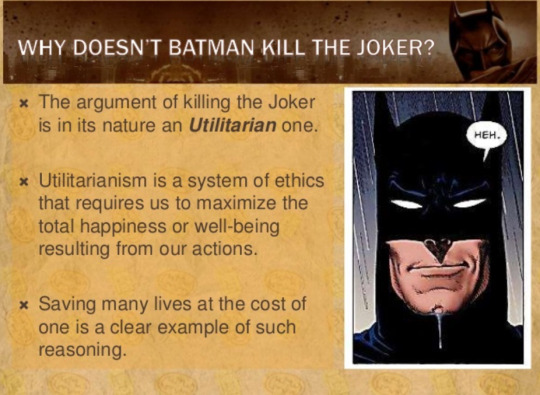
Deontologists believe that the means themselves are the ends. Batman’s no killing rule is a deontological one. Deontologist believe that morals are not determined by the results of our actions, but rather there are set rules outside of our actions that we choose to follow or ignore. A deontologist would say that nothing good can be achieved from unjust means.
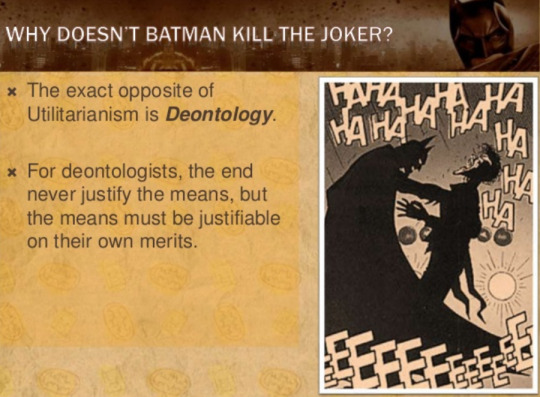
Batman believes killing is wrong, so he won’t kill the joker. The utilitarian argument is an appealing one. Batman could save so many lives if he just chose to bend his rule once. However, the appeal of utilitarianism is its flaw.
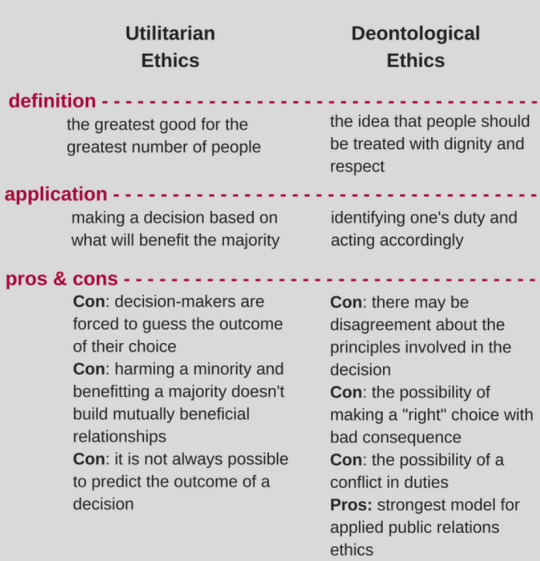
Utilitarianism summed up, is the greatest good for the greatest number of people. However, it pre-supposes that there is an objective greater good that the decision maker is working towards. Humans are fundamentally incapable of being objectives, and there’s no agreed upon objective “Greater Good”, its an idea that varies from person to person.
The problem with “the greater good” is that a lot can be seemingly justified towards it.
The reason batman doesn’t kill the joker, is the same reason crimminals are afforded civil liberties. It’s a deontological one. The idea that people always exist with certain rights, and should always be treated humanely is done for the sake of everybody. It’s not to let crimminals get away with crimes but rather to prevent innocent people from being wrongly persecuted.
For example you can use utilitarianism to justify putting cameras in people’s homes. If people never do anything wrong then there’s nothing to hide, right? Only the guilty will be punished. However, the reason we see this as a bad thing is because the definition of something wrong can change easily. If you put a camera in someone’s house, suddenly speaking badly about the government can be defined as something wrong, and you can be arrested for it.
As stated in the chart above, Utilitarianism is something that can quickly slide into harming a minority for the benefit of the majority.
To take another example from pop culture, there’s the famous scene in star trek 2 where Spock, a person who tries to live mainly by logical ideals rather than emotional one gives this famous quote.
Spock says, “Logic clearly dictates that the needs of the many outweigh the needs of the few.” Captain Kirk answers, “Or the one.”
However, while Star Trek is the source of this quote they also stated the exact opposite idea in the third movie, where every single characters comes together and puts themselves at risk to revive Spock. When Spock comes back to life, Kirk says the reverse.
“The needs of the one, outweigh the needs of the many.”
The third movie states while it may be true that one person’s life is worth sacrificing to help many people, the other is true as well. That many people can come together and risk their lives for the sake of saving one good man. The point being that the world doesn’t exist in strict utilitarian, or Detonological ideals, but rather we’re always working for a spectrum of both. People should make sacrifices for the greater good, and people should respect the individual needs of the minority are two ideas that only contradict each other in a world of black and white, in a world of heroes and villains.
2. Harming the Minority
So, once again returning to the ethical question set up by the Twice and Hawks conflict. Is saving perhaps thousands of people worth killing one good man?
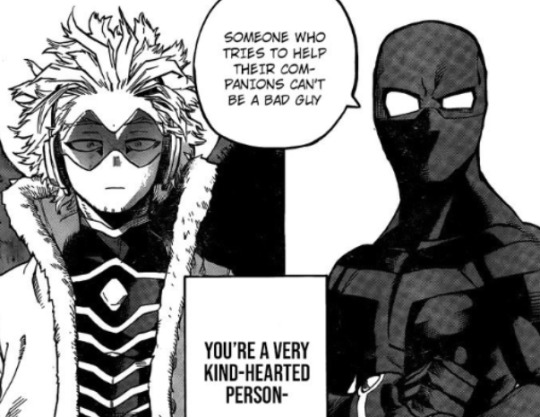
While Hawks is contemplating this question, the story gives us a very deontological rule. Someone who tries to help their companions can’t be a bad guy. Simply put, the act of helping other people is good, whether it comes from a hero, or a villain. In fact we’ve been shown this in the story before, Shigaraki is a murderer who lashes out at random, and he’s also a person who provided a home to several unstable people and helped them improve their lives, both of these ideas while contradictory exist at the same time.
Hawks and Twice’s beliefs contradict each other on a sociopolitical level. That is, both Hawks and Twice have a different idea on how society should be run. Hawks’ ideas are primarily collectivist, and Twice’s are individualist.

Hawks’ ideas are centered around two things, maximizing effiency, and the greater good. His goal has always been to save as many people as possible and to maximize the efficiency of his actions while doing so.

Hawks will always sacrifice the few for the sake of the many. What he believes, and what he was also specifically raised to believe is that he should be capable of saving everybody. That Hawks should devote all of himself to the sake of the people around him. The ideal of a hero, but not really a person. Hawks believes that whether people are saved or not lies entirely on him, and therefore he always maximizes the number of people he can save with every action.

Even sacrificing parts of himself with those decisions. When Hawks knows that he is not strong enough to kill the High End Noumu, intsead he sacrifices his wings (which are Hawks’ symbol of personal freedom) in order to give Endeavor the strength boost to defeat the villain. Hawks has to sacrifice himself. He always has to sacrifice himself for the many.

Which is why Hawks flies so fast. He genuinely believes (or rather was taught to believe) that if he works hard enough, if he sacrifices himself and is the perfect hero then he should be able to save the people he wants to save.

This is what makes Hawks the man who moves too fast. The reason other people can’t keep up with him is because they don’t devote absolutely all of themselves, to the point where they have no lives outside of their own work to the act of saving others.
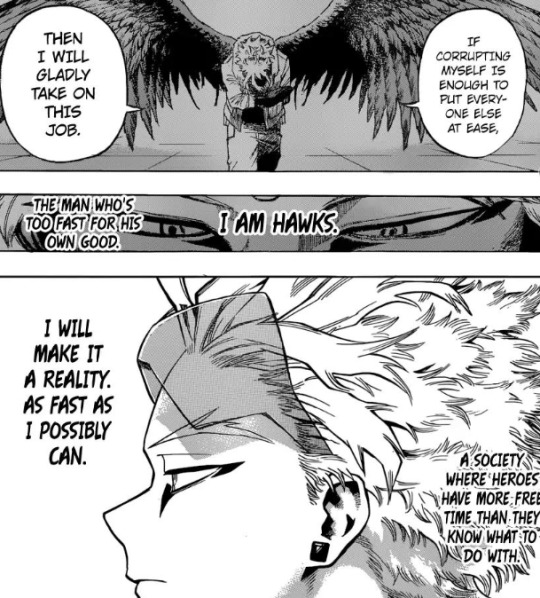
Hawks will always choose the selfless choice. Even the decision to kill is a selfless choice. You could argue that Batman not wanting to infringe upon his personal morals to kill Joker even though Joker might kill other people in the future is a selfish choice to make. Hawks would murder Joker in about ten seconds.
Hawks is a collectivst to the core. His argument is that personal feelings and invidual freedoms should be stomped all over if it’s something that benefits the whole of society.
The ideas of Twice and the liberation front as a whole are individualit ones. Basically, individual liberties should not be stepped all over for the process of the greater good.


The League of Villains and the Meta Liberation front are both a response to hero society’s tendency to let the minority suffer for the favor of the majority. I’ve spoken about this point before, but in the abstract the liberation front has broad, agreeable ideas.
Hero society is conformist in nature. People are often bullied because they do not fit the right kind of quirk.

In a society where literally everyone can shoot lasers out of their eyes, bullying people, intimidating them, pressuring them to conform is not necessarily the right answer. Collectivism works on the idea of there being an in-group and out-group. Obviously, for an in-group to even exist people have to be excluded.
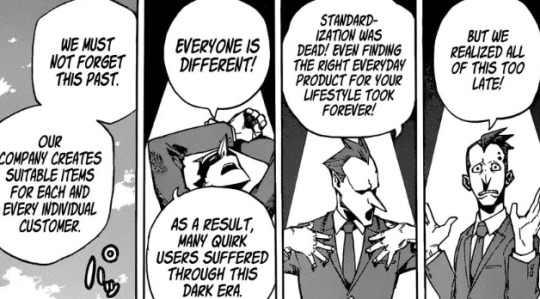
It would make more sense to run hero society from the angle of people have thousands of different types of quirks, we should do out best to maximize the inclusivity of society so that no one gets left out. The fact that people sympathize with the liberation army is because the current hero society, rather than trying to be accomodating to the differences between people and protecting the minority, instead chooses to oppress the minority and let people who could have been helped become villains because it’s just easier.
Which is what Twice’s backstory is entirely about. That even trying with your best intentions to turn your life around, you can fall out of society through no fault of your own.
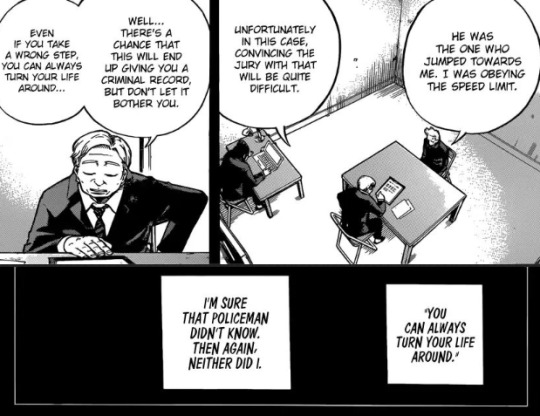
The idea that Twice became a villain not because he’s a good or bad person, but instead because of good or bad luck. Something that Twice really doesn’t have control over.
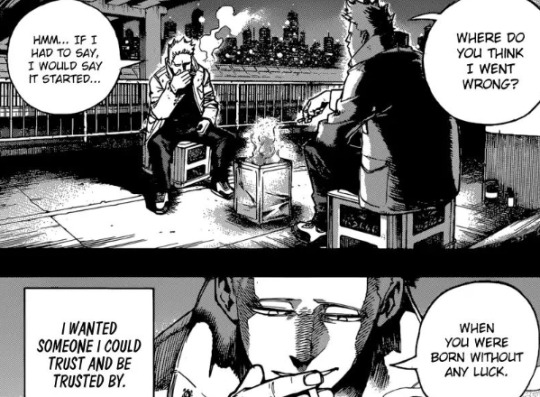
So, the LoV and MLA are an individualist response to an oppressively collectivist society as a whole. Those who cannot conform, want to destroy the current society that excludes them.
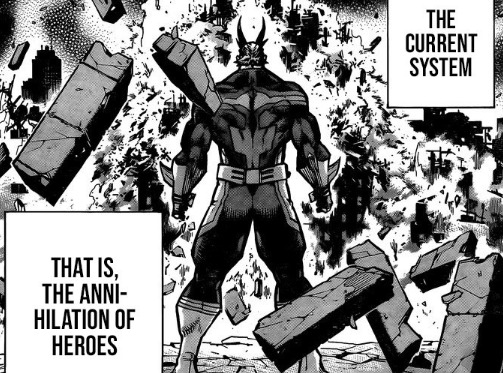
However, Twice values people’s feelings over the greater good of the mission, whereas Hawks will stomp all over his own feelings for the greater good of his mission the twist is that both of them are utiliatarians. Both Twice, and Hawks will justify murder in order to bring their ideal society in place. Twice’s philosophy sounds well and good that people who are outcasts should be taken care of, until you remember that Twice regularly wants to murder people in the name of protecting his small found family.
Twice still believes in a very unhealthy way that he needs to pay everybody back in the League of Villains for accepting him, by being useful to them. Even though the league cares about Twice’s feelings more than his use as a person, Twice still really sees himself the way that Hawks does. The only worth Twice has is a person is how useful he is to other. It’s just both of them justify their utilitarianism through different social viewpoints, Twice kills to protect the few, Hawks kills to protect the many.

3. The Death of a Good Man

Twice has stated these ideas before in the manga. First that he would never kill a friend, and second as what he told Hawks above a person who helps their friends can never be a bad guy. By Twice’s logic alone, Hawks betraying his friend makes him a bad person even if he is betraying that friend for good reasons.
For the final part of this meta I’m going to talk about the flaws of Utilitariansm. I’m going to use an example from another manga, Bungo Stray Dogs with the character Ango Sakaguchi.
In the second light novel we’re told the story of the Dark Era. To summarize, there are three people who work for the mafia, Dazai, Ango, and Oda. The three of them are drinking buddies, and sort-of-friends who meet outside of work and discuss. Eventually their work, or rather the system causes their friendship to fall into conflict.
Of these three people we have:
Oda, a handy man for the mafia taking care of orphans who has a person rule to never kill people directly, because he believes it’s an absolute wrong to kill someone.
Ango, a spy who incredibly similiar to Hawks will lie, manipulate, and deceive his own friends for the sake of what he always calls the greater good.
Dazai, a mafia executive who kills people and joined the mafia because he was suicidal and wanted to find a reason for himself to live.
Dazai and Ango exist on opposite sides of the political ideas spectrum, Dazai is an inidvidualist who only really thinks of himself, Ango thinks of the good of everybody as a collectivist at the cost of his individual relationships with his closest friend.
Oda is somewhere in the middle between them, however he’s acknowledged as a good person. The twist is Oda used to be an assassin that killed many people for whatever reason in the past. Just like Twice, he’s a dangerous crimminal. However, at the same time he was reforming himself, trying to be to a better person, and taking care of several orphans without a home. He had also stopped killing people at this point.
The story sacrifices one individual good man, in order to achieve what is called a “greater good” for everybody else.
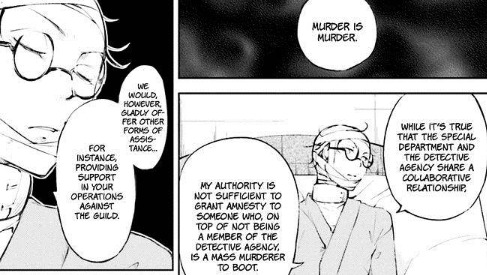
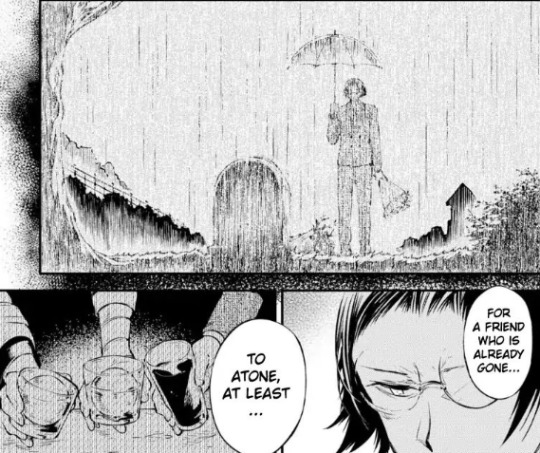
Ango is an individual with a strict and unbreakable moral code, always acting for the good of the majority. In a simple black and white story, he would be seen as a good person. However, not only did his actions result in the death of a good person, or at least a person trying to be good, all of the orphans Oda was trying to take care of died as well. That is a powerless minority was considered an acceptable sacrifice in order to maintain the status quo for a majority of people.
We see Ango make these choices again and again. To betray individual people for the sake of a faceless majority.

In the most recent chapter of the manga, he almost decided to shoot Atsushi in the head in order to make a quick decision to save as many people as possible. He even pretty much convinced himself that his only choice left was to murder Atsushi. Atsushi of course being… another powerless orphan with very little agency within society as a whole.
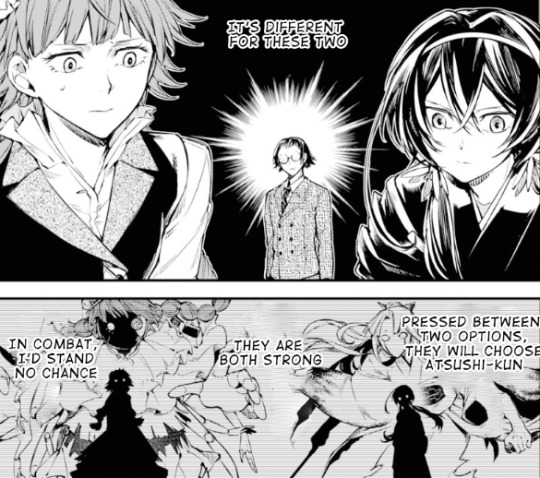
Ango would sacrifice Atsushi, someone who trusts him and is working with him if he thought it would help the greatst amount of people. Whereas, Lucy and Kyouka are people who would not kill Atsushi if they thought it would save people. They’d prioritize Atushi over the majority. Here we are coming into that conflict again.
However, as I’ve pointed out: the people who tend to be sacrificed are always in the minority. They would have been on the losing side regardless. Which is why true utilitarianism is impossible, because Ango is not making objective decisions here. He’s actually making very personal ones on the premise that he’s being objective. He keeps targetting over and over again peopele who are considered in the minority, and not only that Ango is very good at concinving himself he needs to do these things. Just as we witness Hawks convince himself that he needs personally to take out Twice.

Both of them are convinced that they are operating objectively, but instead are making very personal decisions. They have to be the one to pull the trigger themselves, Hawks corners Twice with a knife and Ango was ten seconds away from shooting Atsushi in the head the moment Atsushi stops being useful to him. Both of them repeat the worst flaws of their utilitarian mindset, by judging people based on their use to society as a whole rather than whether ot not they have the right to live and improve just for being people.
The counter to this logic is empathy. Twice is capable of murdering a lot of people, and has even done so in the past. However, at the same time that doesn’t make Twice a bad person, or a person capable of only doing bad things.
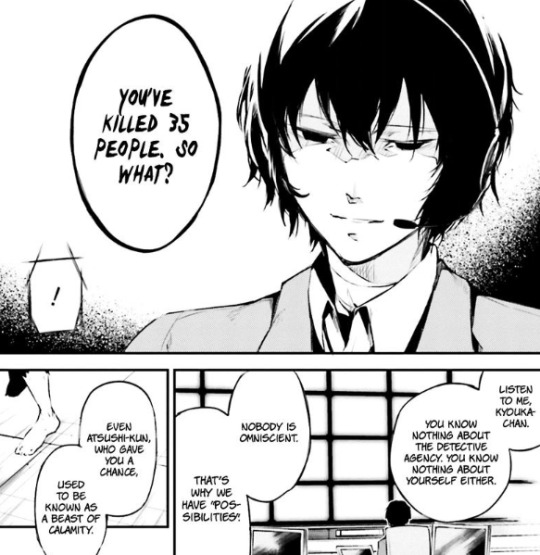
Opening your mind to the idea that people are both capable of good and evil depending on the circumstances, allows a person who has done bad things to be given the chance to do good things for the sake of others around them. Twice has done bad things in the name of the league, but it’s also Twice’s love and genuine compassion for others that has stabilized mentally a lot of the members of the league and allowed them to become better as people.

Someone capable of fighting to kill is also equally as capable of fighting to use that strength to protect. Basically, reality will always be at odds to ideals. Neither Hawks’ ideals nor Twice’s ideals allign with the reality that both of them exist in. Which is why there’s actually no need for them to fight each other.
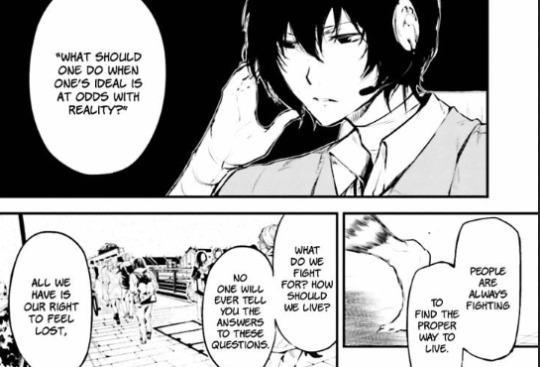

Empathy is the idea that everybody is struggling to live in their own way, that everybody is trying to live by their own means. Rather than forcing Hawks to Twice to fight, both of them could recognize that the other is struggling and needs help. Hawks needs someone to tell him that he deserves to be selfish, and take care of himself instead of continually sacrificing both himself and his emotions for the greater good. Twice needs someone to tell him that he doesn’t need to kill people, to be accepted by society. For both of them there are other options that exist, it’s just without empathy, without acknowledging the viewpoint of another person neither of them would ever be able to see those options.
What Hawks and Twice need isn’t for one of them to be right, and one of them to be wrong. They don’t need to fight and see who wins. What they need ultimately is each other to make up for what they are lacking individually. They are both victims with several things in common, while they’re capable of hurting each other because of what they have in common, they’re also equally capable of smypathizing with one another and helping to heal.

#hawks#takami keigo#twice#jin bubaigawara#my hero academia meta#league of villains meta#hawks meta#lov meta#philosophy#utilitarianism#deontology#collectivism#individualism#mha meta
409 notes
·
View notes
Note
(Sorry if it’s already been asked)what’s your interpretation/view of the quadrants? What in your mind makes an healthy and unhealthy quadrantship?
*distant drumbeat* I’ve been WAITING for this one! Turn it up!!!!
So, a few general notes about quadrants before getting into a breakdown. First, I don’t think there’s a hard and fast definition of what makes, say, a healthy kismessitude, any more than there’s a hard and fast definition of a healthy human relationship. What would be toxic and terrible for one couple may be exactly what keeps a different relationship together. Meowrails is very different from pale Vrisrezi, because Equius and Nepeta are different people with different wants and needs in a relationship than Vriska and Terezi. As with all bonds, it’s important to look at a broader trend of behavior and the individual mental health levels before you can say “this is unhealthy”. I DO think there are certain things to watch out for, but ultimately I probably have ships in that quadrant that may violate one or more of those “no-nos” just because of how those characters bounce off each other.
Second, I think there’s more fluidity in quadrants than the fandom typically allows for, because human relationships are also by their nature fluid. We’ve all seen a set of best friends who act like a couple even if they aren’t romantically interested, and we’ve seen couples who bicker and squabble despite being deeply in love. How you choose to identify your relationship is ultimately nobody’s business but your own, even if red love for you looks like pale love to someone else. Alternian troll culture is romance obsessed and this can lend itself to an obsession with defining the attraction, but this doesn’t mean that’s necessarily how it HAS to be.
Finally, I’ll be listing ALL confirmed canon examples of each quadrant to provide a context for what I’m referencing. This should not be taken as necessary endorsement for any of these ships, or even that I think they were a “good example”, simply that how they chose to identify influenced my own definition of these quadrants. I will also be leaving out a lot of ships that would seem to fit a particular quadrant (noteably Rosemary and Arasol) because their own status is complicated in-text (Rose explicitly refers to wanting to be in all of Kanaya’s quadrants and their relationship has tended explicitly pitch at points, Sollux is referred to as Aradia’s “boyfriend” and yet there is apparently no issue between either of them when his flush quadrant becomes occupied)
With that, let’s dig in
Matespritship:

Successful/Actually Date(d) Examples: Dad/Mom, Latula/Mituna, Meulin/Kurloz, Aranea/Porrim, Mindfang/Summoner, Meenah/Vriska, Sollux/Feferi, Konyyl/Azdaja (currently vacillating), Stelsa/Tyzias
Crushes (unrequited, vacillating, or thwarted): Eridan/Feferi, Kanaya/Vriska, Nepeta/Karkat, Equius/Aradia, Tavros/Jade, Gamzee/Tavros, Sollux/Gamzee, Jack/PM, Lynera/Bronya
What it means to me: Matespritship tends to be an opt-out quadrant for a lot of people, I think. Most seem to stop reading at “closely analogous to human conceptions of romance” and turn off their brains. However, as with all things troll culture, I think there’s more to it the deeper you go, especially considering the fact that your moirail is expected to do a LOT of what we would consider standard s/o stuff: caretaking, comfort, intimate knowledge, closeness. I absolutely refuse to buy that the only thing distinguishing the two is that matesprits have sex, especially since that stumble into some VERY UNCOMFORTABLE territory in regards to troll asexuality. So then, if it’s not that, then what is it?
Ultimately I keep coming back to the idea of passion. Your matesprit I think is the person who you genuinely see in the best possible light. Unusual for Alternian society, you’re unable to ignore the depths of your admiration of them, or to let their flaws filter into your perception. Moiraillegiance is about total honesty and unflinching recognition, but matespritship to me is about that kind of fairy tale passion. Its a person who, even if you know on an intellectual level they are not perfect, that you genuinely have a harder time seeing the darker side of because you are so consumed by this passion for what you see in them, your unfiltered awe and appreciation for who they are.
Additionally, I see matespritship as on some level inherently possessive. You not only admire that person, but you fundamentally crave their attention in a way that is probably a bit on the selfish side. Its not enough to want good for them, it has to be good alongside you. This is typically where it’s more prone to flipping caliginous.
Warning signs: Matespritships seemed to vacillate pitch FREQUENTLY on Alternia. This is not necessarily a sign that something is wrong. As Karkat says, it’s often a matter of communication and timing. However, it does have the potential to explode in everyone’s face if not carefully managed, in no small part due to the passionate emotions involved. Some things that tend to go bad fast:
-Admiration is key to an effective matespritship, but pedestalling your flushed partner too much can be dangerous. Once the flaws do become apparent (as they will in any relationship) they can become increasingly hard to ignore, and that can be SHATTERING if you don’t prepare.
-Especially on Alternia, matesprits are the quadrant I see as most likely to neglect the communication aspect of their relationship. Safety isn’t a factor for them like it is for more caliginous quadrants, and the expectation is usually that feelings jams are for moirails. Especially for younger trolls, there’s an idea that we’re in love and thus should just know what the other person needs/wants. If you don’t pick up on it, then maybe we aren’t meant to be. This is a trap. ALL relationships need communication in order to function on a day to day basis. Opening up to your matesprit about something that’s bothering you isn’t a sign of fading passion, but of maturity and your own changing needs.
-Despite a fondness for fate pairings I think matespritships are usually expected to fade out, in no small part because they’re founded on a level of passion that can be hard to keep up long-term. This is actually fine. Not all relationships are meant to last eternally. However, if you know your matesprit is a person you want in your life long-term, part of that is learning how to cope with periods of low passion. Its normal to not always feel an all-consuming desire to keep your matesprit in arms reach. It’s normal to need space. What’s important is that YOU know that you still love them, and that they have the confidence to know that’s true even when you can’t always express it.
Moirallegiance

Successful/Actually Date(d) Examples: Kanaya/Vriska, Eridan/Feferi, Gamzee/Karkat, Nepeta/Equius, Kurloz/Mituna, Meulin/Horuss, Terezi/Vriska, Kuprum/Folykl, MSPAR/Polypa, Xefros/Dammek
Crushes (unrequited, vacillating, or thwarted): Eridan/Karkat, MSPAR/Chixie, MSPAR/Stelsa, Tegiri/Polypa
What it means to me: To start out with, I haaaaaaaate hate hate the perception that moirails are just BFFs. To me, there’s too much evidence to suggest otherwise, not the least of which being that after Feferi ends their moirallegiance she tells Eridan she still wants to be friends with him. How many of you break up with your best friend and then tell them you can still be friends after?
To me, moirallegiance on Alternia is as much a coping mechanism at it is a romantic entanglement. In a society where there’s no such thing as therapy, your moirail ideally functions as a release valve for you, to help you exercise softer feelings in a safe, sanctioned environment. Two things are key in that dynamic: honesty, and selflessness.
There’s no pretense in a moirallegiance, but an unflinching embrace. The successful moirails we’ve seen (Meowrails, KupFol, arguably GamKar) have always been rooted in banter that may come off as pitch at first glance. This is partly due to general Alternian socialization practice, but I think it also stems from the fact that pale love is founded in knowing every inch of your partner. You know what they are, body and soul, the flaws and the highlights, and while you do not uncritically accept it like a matesprit might, some part of you fundamentally identifies with. Your moirail is that person who you feel like you’ve known for years after talking for a few hours, because something about how they’re wired clicks with you in a way most don’t. As such, there’s less need for posturing. A feelings jam is one of the few places on Alternia where you are allowed to admit to vulnerability, to fear, to frustration, because you know that the other person will have your back unquestioningly without letting you get away with bullshit.
This mutual support stems from the other half of pale love: the desire to see the other person flourish, no matter what. If the matesprit wants you to be happy at their side, the moirail wants you to flourish even if they do not stand to benefit. You experience your moirail’s success like it was your own, and want as good for them or better than you want for yourself.
Some warning signs:
-Burnout. We see this in most clearly in Eridan and Feferi’s case (and a bit in Gamzee and Karkat’s case), but its a genuine risk in moirallegiance. The caretaking HAS to go both ways or the relationship is doomed to fail. More often than not, burnout indicates a failure within the relationship. Your moirail has not been caring for you to the degree you need, and quite possibly you have not been communicating HOW you would like that behavior to change. As I said, honesty is essential, and things ideally should never reach the point of burnout because you are in constant complete openness with your moirail about how you need taking care of.
-Fucked expectations. Romance is a dominating subject on Alternia, for obvious reasons, and one of the biggest hits a moirallegiance can take is a person questioning too far into pale desire until they mistake it for something else. The two are very close, but they are not exactly the same thing and often times the relationship can be sunk by one person getting in their head about that intimacy until they try to make it something it isn’t. Moiraillegiance is not a stepping stone for matesprit or kismesis, and most importantly it is not a consolation prize quadrant. You should never “settle” for moirail, or pale date someone who will accept you as a moirail only if they can’t get you as anything else. You need to want a moirail for a moirails sake, or its just a crush with extra levels of fuckery and expected free therapy.
Kismessitude

Successful/Actually Date(d) Examples: Spades Slick/Sn0wman, Jack Noir/Black Queen, Eridan/Vriska (now broken up), Karkat/Karkat, Mindfang/Dualscar, Terezi/Gamzee, Tagora/Galekh, Bronya/Elwurd.
Crushes (unrequited, thwarted, vacillating): Eridan/Rose, Vriska/Tavros, Karkat/John, Gamzee/Dave, Sollux/Gamzee, Eridan/Sollux, PM/Bec Noir, Terezi/Vriska, John/Terezi, Konyyl/Skylla, Daraya/Lynera
What it means to me:
I want to structure this as a dismantling of two very common misconceptions I see for this quadrant. One, kismesis is NOT the inherent abuse quadrant. This I believe is working with a faulty definition of what abuse is. Abuse is not simply being mean or engaging in a physical manner with somebody. As has become something of a mantra for this essay, its about expectations. Abuse requires someone to be taking advantage, exploiting a particular vulnerability (or creating it if none inherently exists). What makes a relationship abusive is a situation where someone you SHOULD be able to trust or care for uses those expectations to hurt you, either for personal gain or simply to make themselves feel better. A kismesis is not that, because a healthy kismesis goes in with the expectation of rivalry. For some kismeses, this looks like basic sniping, insults, and jabs. For others, it looks like actual fighting. In either case, its the difference between a boxing match and assault. As long as the rules are being respected, both parties are consented, and someone is checking in to ensure that no one is hurting themselves (sometimes your partner, sometimes your moirail, sometimes your auspitice), then there is nothing inherently wrong with having a circumstance in which you are allowed to work through some nastier feelings without fear of consequence or hurting someone who can’t take it.
The second misconception: kismesis is not just a relationship with some bitchier dialogue. As we’ve seen, being a little bit rude is not restricted to pitch feelings. We have many examples of it in relationships that would be considered unequivocally red or pale on Alternia (KupFol, MeenVris). I go back to the Karkat dialogue constantly. Your kismesis is not just a person you make fun of, but something closer to your true rival (in the shonen anime sense). Its a person who you see so much good (or potential for good in), but who is brought down by some kind of fatal flaw that just grates at you. And so, you fixate on the idea of pushing them out of that flaw, through whatever means necessary.
Its from this fatal flaw that I believe the benefits of kismesis come out. Your kismesis, like your matesprit, has intense passion for you, but doesn’t idealize you. In fact, at points your kismesis may be incredibly aware of the WORST possible version of you. What distinguishes it from platonic hate, though, is the fact that you at your worst doesn’t make them flinch. It makes them want to provoke you, to see how you can change. Kismeses sharpen each other, which is something that rarely feels good but is so often necessary. You should never let your kismesis sit back too far on their laurels, because it is your job to be consciously aware of their faults and call them out on it.
Additionally, while the hatefucking aspect is often overestimated, I think its not surprising that passion in these kinds of relationships tend to get intense, which is part of why it so often requires some kind of ashen intervention. Once harnessed, though, that passion can be turned to powerful ends for both yourselves and the world around you.
Some things to watch out for (unsurprisingly there’s a LOT for this one but I’ve distilled it into two broad ones because this thing will be long enough):
Power imbalance: As I said, kismesis is not inherently abusive. However, it DECIDEDLY has the potential to become so, in particular in a society like Alternia where the power strafes are often so significant. This is particularly the case in pitch relationships involving a highblood and a lowblood, especially when the highblood is “steering the ship”. Vriska/Tavros is a good example. If summarized, her feelings for Tavros pre-Sgrub are very straightforward and healthy pitch ones. She admires his potential and envies his kinder relationships while despising his indecisiveness. All fine enough groundwork. However, three factors collaborate to make it a hot disaster: Tavros’s disinterest in her (meaning the pitch advances are unwelcome and in some real sense nonconsensual), Vriska’s own lack of restraint (meaning she takes things too far even for a kismesis), and the inherent caste imbalance (meaning Tavros has no meaningful way of fighting back and nothing in Vriska’s rearing has taught her to care if a lowblood gets hurt by her actions). This isn’t to say a highblood-lowblood (or any humanly imbalanced relationship) can NEVER work, but it requires both parties to put the work in to even the playing field. The highblood needs to actively show restraint, both physically and situationally. This is also where an auspitice generally comes in handy, ensuring things never get to a point where the action becomes one-sided.
Misdirected Rage: As I said, kismessitude is a Space, much like moiraillegiance, that gives you the opportunity to work through some less-than-palatable emotions. Using a pitch date as a way to burn off stress is not inherently invalid; in fact, its often expected and as long as your partner is willing can be one of the better ways to cope with something without having to address it directly. However, this CANNOT be built into the foundation of the relationship. Your kismesis is not a punching bag, but their own person, and the focus always needs to eventually return to that. You cannot effectively sharpen someone else if your anger is never about them, and it is ultimately unfair to constantly ask someone else to consistently bear the brunt of your bad days. This is (debatably) where pitch Gamrezi went wrong. Ultimately that kismesis was never really about each other, but about both of them projecting their self-loathing onto the other person when they were both at incredibly low place, thus making their anger unproductive and meaningless for both of them. As such, any kind of empathy was impossible and they were not able to self-regulate.
Auspiticism

Succesful/Actually Date(d): Vriska/Kanaya/Tavros, Karkat/Jade/Karkat, Spades Slick/Doc Scratch/Sn0wman, Liv Tyler/Courtyard Droll/Wizardly Vassal, PM/Jade/Bec Noir, Kanaya/Vriska/Rose
Crushes (unrequited, thwarted, vacillating): Vriska/Kanaya/Eridan, Gamzee/Rose/Terezi (look I know this one is practically canon but Rose kind of implies she never really used those auspiticism lessons), Rose/Kanaya/Horrorterrors, Eridan/Feferi/Sollux, Gamzee/Kanaya/Karkat, Dave/Kanaya/Karkat, Konyyl/MSPA Reader/Azdaja.
What it means to me: Ahh the bastard child of quadrants. I’ve got a lot of unpopular opinions on auspiticism (most notably that Kanaya isn’t actually that good at it), but let’s start with defining some things. I believe there are two kinds of auspitices.
One is the “breakup” auspitice. This is the version described in the infamous romance pages of Homestuck. This version is meant to prevent a black romance from breaking out where one shouldn’t occur, either because one or both parties already has a kismesis or because there is some other mitigating factor that means neither can afford to get bogged down in this crush. A breakup auspitice should ideally be a figure that both parties trust, even in the midst of heated feelings. They should also have the strength of will to continually interfere, and a clear enough head to cut to the root of the issue. Its a thankless task, often, but a very vital one, and most importantly, short-lived. This auspitice’s job only lasts as long as the feelings last. Once both parties have had the chance to cool down (or the circumstances creating the rivalry are at an end), their job is considered over.
The other kind is the version that we arguably see more of in canon, what I call the Third Leaf. This is less an intercessary party and more the third member of a particularly tempestuous kismesis, who will act to ensure the other two leaves don’t cause serious harm to themselves or each other. This relationship is far more long-term, and thus has more requirements. To me, your auspitice is someone who has pale potential with both you AND your kismesis. They know and care about you both on a very deep level, to the point that they are willing to put themselves in the middle of your bullshit very consistently. This means that you trust them enough to call it quits even in the heat of your anger, and you also believe what they tell you about your own pitch partner when their actions need greater contextualization to keep things on the level. This task is often equally challenging, but (hopefully) not as thankless or as pragmatic.
I’ve previously referred to the auspitice as a personified safeword, and I believe that’s very emblematic of the Third Leaf. Even healthy kismeses may reach a point where one needs a day off, or something hits in the wrong way. In a rivalry, though, admitting that isn’t necessarily easy, as its both breaking kayfabe and has the potential to read as more weakness that needs to be excised (”it hurts because its working”). The auspitice is privileged to go between and be believed every time. If your auspitice says its a no go then you better have a pretty damn good reason to ignore them. For some kismeses, overriding the auspitice is grounds to break up once and for all.
Some warning signs:
Burnout: As is the case with the previously discussed concilliatory quadrant, caretaking can be exhausting. This is especially the case in auspiticism, where the care is often expected to be very one sided, and usually involves dealing with a lot of vitriol, anger, and even physical violence. Obviously its more prevalent in Third Leaf dynamics, but even breakup auspitices can reach a breaking point if they’re not careful. Its important as the ashenmate to understand your own limits. For better or for worse, the focus will not be on you. If you are reaching a low point, then you need to be vocal about this with your other two leaves, or disaster is almost inevitable. The trade-off for this is that (according to my headcanons at least), your ashenmates are expected to drop everything to care for you if you need it. The kismesis will not be safe to proceed until you are back in fighting shape, and as such a truce is declared until they have both done “aftercare” of a sort for you. What this looks like is different for every auspiticism. For some, its alone time. For others, its blanket burritos, movies, and forehead kisses. No matter what, though its IMPERATIVE that you find a method that works for you, because the relationship crumbles without self-care.
Doormatting: As I said, auspiticism is a concilliatory quadrant. As such, there can be a tendency to over-forgive or overwork, especially if your other two leaves have stronger personalities. In particular, ausptices who are closer with one leaf over the other need to be vigilant for favoritism or bowing down. It is your job to contextualize the actions of your ashenmates. It is not your job to do apologetics for them or atone for their actions. Hold them all accountable. They need to be putting in at least as much work as you do to make their relationship work and not just offset the emotional repair to you.
Controlling: The inverse of this is the power-tripping auspitice. This seems unlikely, but its more of a threat than one might think, in my view. Because of the trust auspitices command by virtue of their position and their relationship with the other two leaves, their word is in some sense law. This can be addictive to some people, and lead to an abuse of power that can be just as toxic as in any other quadrant. It can look like scolding your ashenmates far too much, placing yourself at the center of their issues, or even punishing them for annoying you when what they’re doing is perfectly acceptable within the context of a kismessitude. As I said, self-care is important for an auspitice, but selflessness needs to be at the core of concilliatory dynamics. You are here because you genuinely want good for the people you are mediating for. If the relationship has become all about you, then something has gone horribly wrong. Avoid the urge to power trip just because the role is sometimes a Lot.
#Anonymous#homestuck#quadrants#matesprit#matespritship#kismesis#kismessitude#moirail#moiraillegiance#auspiticism#auspitice#headcanon#long post
196 notes
·
View notes
Text
Psycho-philosophy & the angels, fallen or not (part I)
I swear I wasn’t taking any mind-altering substances while I wrote this. It’s very heavy and I’m not sure anyone will enjoy it, but I felt like I had to get it out.
And now it’s too long to be just one part. Here is the first part anyway.
It’s established that Aziraphale and Crowley symbolize the “opposing” sides of human nature, but I have a pretty difficult time with believing that they actually represent “good” and “evil.” THEY believe they represent “good” and “evil.” But even before the two of them develop their humanity by spending time on Earth, before they start to affect each other, they both have philosophies that are far more complicated than just “do good things/be helpful” or “do bad things/be hurtful.”
Before you can be “good,” you need a definition of “good.” And the same goes for “evil.” And I absolutely do not think that the characters’ personal definitions of “good” and “evil” match with the narrative’s definitions of “good” and “evil” (which I’m not strictly sure it really has). So...what might they represent more closely?
In extremely broad terms based more in dictionary definitions than in the finer points of academic philosophy, I’d cast Crowley as the individualist and Aziraphale as the collectivist. Individualism is the prioritizing of the individual’s interests over a group’s interests. Collectivism is the prioritizing of a group’s interests over the individual’s interests.
Obviously, this is heavily informed by abuse from their Sides. Hell motivates its demons to behave by making them fear for their own souls using physical intimidation. Temptations are also usually focused on taking advantage of some selfish motivation in humans. Heaven, meanwhile, motivates its angels with the promise of the Greater Good, intimidates its angels with the belief that disobedience is out of line with the Greater Good, and shames its angels for acting with any sort of personal interest.
“What?!” you say. You’re going to cast Crowley, the guy who initially hatched the plan to try to save the world at great personal risk, as the self-centered individualist, and Aziraphale, the hedonist who’s just about ready to watch the world burn at Heaven’s command until Crowley buys him lunch, as the collectivist one?!
Well...in a way. Because while the characters believe they represent these ideas, and while they genuinely buy into them on some level, the whole point is that the two viewpoints taken to extremes end up looking awfully similar. They also rely on each other, no matter how much they try not to.
I should clarify a few things before arguing any more.
The perceived “selflessness” of collectivism is sometimes idealized, and that’s why it maps onto the supposed “goodness” of Heaven, but it doesn’t actually mean kindness, compassion, or goodness. It means not considering oneself - including one’s own identity, preferences, or moral conscience. Likewise, the perceived “selfishness” of individualism is often vilified and gets cast as evil, which is why it maps onto Hell, but all it really means is placing one’s own perspective at the utmost importance, which can be beneficial depending on who’s doing it.
I’ve seen some incredibly smart commentary on the Good Omens book being a just-barely-post-Cold War novel comparing, among other things, Capitalism (heavy on individualism) and Communism (heavy on collectivism). I thought the analysis I read was brilliant, it told me a lot that I had not thought of before, and I would love to read more. But that’s not what I want to talk about here.
In this essay, I’m really sticking to the terms “individualism” and “collectivism” as they inform the psychologies of individual people (Crowley and Aziraphale). I’m trying to have a discussion that I think is important, because it’s important for humans to have a healthy notion of how individuals fit into their relationships and communities, but my commentary is much more vague and not tied to a specific moment in history. I’m frankly not very qualified to talk about the Cold War, anyway.
Crowley and Aziraphale are a couple of paradoxes. At least, they’re paradoxes until they discover Earth as their true allegiance, at which time they just become two balanced angels of neither Heaven nor Hell.
CROWLEY’S PHILOSOPHY
Crowley knows he’s supposed to represent Hell and the kind of self-interested desperation that drives people to damnation - a kind of extreme individualism. But he’s been condensed into an Earthly being who’s formed relationships and preferences and loves and, gosh, although he wouldn’t admit it, a conscience. Unlike Aziraphale, he’s much more OK with this sense of identity, because individualism is not incompatible with being, well, an individual. But he does struggle with the fact that he’s supposed to be working toward The End Of All Things for his own self-preservation when his real wish is for The Continuation Of All Things.
Most of Crowley’s decisions are framed from his own personal opinions. He approaches the world as he sees fit, which includes accepting his job of damning souls because he has to or he’ll get destroyed. He does what he needs to survive, so you could say he “answers to the higher power of Hell for self-interested reasons,” but for moral purposes, Crowley does not answer to anyone. Interestingly, though, he DOES have a conscience based in his own feelings.
By personality (not because he serves some moral power but because it’s just his personal preference), Crowley does not like certain kinds of cruelty. He’s willing to do his job, but he doesn’t enjoy taking free will away from people, for example. And in most cases, outright violence (like Hastur turning into a pile of worms and eating the telemarketers alive) is not something Crowley is into, either. In this case, the fact that he’s self-motivated means he has enough imagination to grasp what it’s like to be another person, and while he’s willing to upset people/give people the opportunity to damn themselves/generally be inconsiderate in public, Crowley simply does not enjoy the experience of destroying others without giving them a choice.
Oh, and we can’t forget: “You’re supposed to test them, but not to destruction.” It’s Crowley’s personal feelings that lead him to believe Armageddon shouldn’t happen, and Crowley’s personal feelings that lead him to act out against Hell.
With all that said, Crowley feels a profound love for the world and Aziraphale (whether he’ll admit it or not) because he really enjoys it on Earth, and he wants to keep enjoying it. Therefore, all of his “individualism” ends up working in the favor of the “greater good” anyway. In the end, Crowley temporarily loses hope and stops fighting, but by this point, he’s already had his positive effect.
It’s kind of like Terry Pratchett’s powerful quotation about witches being selfish. “All witches are selfish, the Queen had said. But Tiffany's Third Thoughts said: Then turn selfishness into a weapon! Make all things yours! Make other lives and dreams and hopes yours!” Maybe it’s not so intentional on Crowley’s part, but the outcome of his love for Earth and his bond with Aziraphale ends up serving the interests of others.
Crowley’s journey involves a less drastic change than Aziraphale’s. Once he thinks it’s possible to fight for the world and survive, he doesn’t have a single qualm about it, because he answers to his own standards, not anyone else’s.
AZIRAPHALE’S PHILOSOPHY
Aziraphale, on the other hand, has to basically figure out that it’s a good thing to use his own judgment instead of Heaven’s. In doing so, he has to rewrite his belief system and even rework his identity.
Aziraphale knows he’s supposed to represent the collective, Heaven, the Greater Good. But he’s been condensed into an Earthly being who’s formed relationships and preferences and loves and a conscience and an identity of his own. At first, this feels wrong to him, because many of his personal interests go against Heaven’s. It’s why he’s so incredibly good at repressing and denying; he has this sense of Self but doesn’t believe he’s entitled to it and doesn’t realize there is any way to separate from Heaven, so as far as he knows, to allow this Self to grow and flourish would ultimately be extremely painful and potentially dangerous. You can tell the other angels aren’t happy with his sense of self, either, as far as he allows it to go (see: any interaction in the bookshop, Gabriel’s behavior over the sushi).
Aziraphale is so oriented toward the Heavenly collective that he literally denies himself his own judgments, his own opinions. He’s convinced that Heaven is the Greater Good, so he accepts that as reality no matter how absurdly wrong their actions might seem to someone with an iota of common sense. He has not been allowed to have an opinion on it, and he will not form one now. He does intensely enjoy performing altruism and does not approve of Heaven’s plans to drown all of Mesopotamia and turn Lot’s wife into a pillar of salt, but he will even push aside the satisfaction of kindness and the fear of cruelty if he’s told that his feelings don’t fit within the Great Plan.
It’s important to note that as far as Aziraphale believes, the existence of Hell and the work that Crowley is doing for Hell is in fact part of the Great Plan. He says as much to the Archangels when they bully him outside his bookshop.
Aziraphale is enthusiastic and adoring about life on Earth and about humans - and about Crowley! And oh, he does indulge. But he sees this all in a rather passive way, at least at first. He is simply enjoying the world and allowing the Great Plan to unfold. He does not think he has the right or ability to defend the world from Heaven’s judgment, even though he wants to. So, like Crowley’s self-orientation coming full circle to serve the interests of others, Aziraphale’s orientation toward the collective comes full circle to become very self-serving.
THE TWO TOGETHER
Enter Crowley’s judgment. Crowley is really fantastic company, but I think the specific thing he did in the long run was to help Aziraphale see that his own desires and judgments matter. Even when Aziraphale temporarily disavowed their relationship, Crowley’s influence was strong - would the Aziraphale who was standing on the Wall of Eden, or the Aziraphale who witnessed the Great Flood, have chased Gabriel around asking if the war was necessary, or would he have called the Metatron to argue everyone could be saved? Even when Aziraphale doesn’t actually ask questions, these interactions are an assertion of Aziraphale’s own feelings and judgments when he’s being told to be quiet and fall in line. And I really do not think he would have made these assertions before his long Arrangement with Crowley. In this way, Crowley gave Aziraphale the world and the gift of Being Himself.
As for Crowley, he doesn’t care about any Great Plan and thinks Heaven’s will is positively odious, but Aziraphale is convinced that the cosmic dance between the two of them is just ineffable. By playing along with that notion, Crowley allows it to become a self-fulfilling prophecy. The meaning of Crowley’s existence goes from “just make everyone as miserable as possible” to “balance out Aziraphale” which really means “create a world that doesn’t suck as much as Heaven or Hell, which are both insufferable.” In this way, Aziraphale gave Crowley the world and the gift of Being Part of Something.
56 notes
·
View notes
Text
The Lies and the Truth. Lucien in Chapter 13
Lies have just as much power as the truth.
Let’s talk about a phone call in chapter 12 first.
After Yōurán got home from Jay’s death, Lucien immediately calls her. Jay’s death was Black Swan’s doing so of course he knows what happened in STF. He called her to check if she didn’t get hurt. This is what he says in the call:
Lucien: Lies have just as much power as the truth. They’re also an indirect reaction to the essence of things. The truth is often less pure, anything but simple. Since it’s so complicated, it’s alright if we’re a little slow figuring it out. No matter what the truth is, I’ll always be with you. Up until the moment it comes.
Oh, so many hidden meanings, professor. Let’s look at them one by one.
Lies have just as much power as the truth. They’re also an indirect reaction to the essence of things.
He couldn’t have put it much better. His love for Yōurán was supposed to be a lie to hide the truth, but it became too powerful and became another truth that showed what the “essence” was. Who he was before Black Swan, who he could have become if he hadn’t crossed paths with them.
The truth is often less pure, anything but simple.
He’s cruel Ares who’s tried to lure Yōurán into a trap, but he is also gentle Lucien who cares for her and guides her. That one of them is the truth doesn’t necessarily mean that the other is the lie.
It’s alright if we’re a little slow figuring it out. No matter what the truth is, I’ll always be with you.
This sentence foreshadows what will happen in chapter 13. At this moment, Lucien is already anticipating that Yōurán will find him out someday.
When Yōurán tells him that she wants to find the truth but is afraid of what the truth might be, he encourages her and tells her that he will accompany her along the journey. When she asks, he will answer her, just like he always has.
Up until the moment it comes.
Even if the truth is his “betrayal”. Lucien is perfectly capable of hiding his other identity while leading Yōurán on a wild goose chase. Yōurán discovered who he was because he let her.
Goodbye, Josie
In the beginning of chapter 13, Josie is confronted by Ares. She asks why he teleported her when she was about to succeed. Unfortunately for her, Josie’s fate was set the moment she put Yōurán in danger.
No matter what backstory he has, it doesn’t mean that Ares is not a villain. If he hadn’t fallen in love with Yōurán, he would have used her and discarded her just like he did with Josie.
On the road to Truth
Gavin is gone. Victor is unreachable. Kiro retired. (By the way, Kiro, why is your agency named B. S. Entertainment…?)
When Yōurán hears that a black wind appeared at the twin towers, she hurries there hoping she could see Gavin. She is saved from danger by Lucien’s Evol.
He kept hiding that he’s an Evolver until now. He’s done with hiding.
You knew it was dangerous? Why didn’t you run away? – Lucien
I explained it already in my Chapter 12 analysis. Yōurán is not someone who runs away from danger if people she cares about is involved. She has a tendency to put others ahead of herself to the point of disregarding her safety. (See Lucien’s Overseas date for more about this) It’s her weakness, but also her strength.
Her selflessness is shown in various parts of dates, footage stories and city strolls. Even her show Miracle Finder is a humanistic show sharing heartwarming and hopeful messages, not a sensationalist show for the sake of viewer rates.
If I say I wanted to investigate these incidents would you think I was silly? - Yōurán
I wouldn’t, because I know you. - Lucien
Lucien already knows that Yōurán wouldn’t run from danger. He doesn’t call her silly, or tells her to go home while the men do the work.
Yōurán at first tries to investigate without Lucien, but he can’t have that.
Lucien: I’ve said before, if there’s anything you want to do, I will always help you.
He’s not going to stop Yōurán from walking the dangerous path to truth, but he is not letting her go there alone.
The elevator guy
It’s nice and all that he’s accompanying Yōurán because he loves her and blah blah blah, but it’s also quiet unsettling to see him unfazed in front of the elevator operator when he knows that the poor guy’s misery came from him and Black Swan. While Yōurán sympathizes and tries to help others in her quest for truth, Lucien is doing it totally for selfish reasons. If it’s not Yōurán, he doesn’t give A F. He's not a bad guy gone good. His feelings for Yōurán aside, he is still a bad guy.
I’m mentioning Josie and the elevator guy in my Lucien analysis for this reminder. He is awesome and charming and wonderful and I love him, but I have to say a big NO to his morals.
What you believe in
After they leave the elevator guy, the continuation of their talk in the firefly date happens.
The firefly argument between Yōurán and Lucien about evolution can be summarized as this: Survival of the fittest/Individual sacrifice is necessary for the evolution of humanity as a whole vs Coexistence/We must help each other rather than competing with each other to survive and evolve.
Lucien: If human society keeps developing. It will certainly become like that(disaster).
According to him, whether it’s natural evolution or an ‘artificial’ one by Black Swan, chaos and conflict is inevitable.
Lucien: People will become smarter, more sensitive. But not better, not happier.
But his thoughts about evolution changed somewhat. Seeing Yōurán sad about the weak little firefly affected him to some level. Now he knows that being evolved doesn’t necessarily mean being happier, or better. Yōurán taught him about the feelings of loss, the struggles of the weak to survive, the gentle encouragement to those left behind. Things Lucien considered as irrational sentiment.
Lucien: You must believe, before the worst sets in, that everything can be reborn and transformed.
He didn’t abandon his opinion completely though. I can’t say whether his logic is right or wrong, but it’s no excuse to justify Black Swan’s actions.
Lucien: Promise me, that if that moment really comes, you won’t let the weight of it drag you down too.
= If it really turns out that I’m right, don’t give up. Keep fighting for what you believe in.
I really love this dynamic between Yōurán and Lucien. He’s a bad guy who won’t abandon his bad-guy way of thinking, but he encourages Yōurán to keep on pursuing good even if the bad guys take over the world. They love each other, but they are standing on opposing sides.
The Butterfly’s Choice
When Lucien asks if Yōurán wants to continue, she says yes. She is so set on finding the truth and saving people that she hasn’t even considered how she’s going to stay safe in all this. (Lucien: Oh my sweet silly girl, I admire your courage and good heart but please be careful.)
Lucien gives her an ultimatum. He gives her two choices.
Lucien: The right is to placidly accept a life of protection, with no more mixing yourself up in this world’s turmoil. The left is to actively seek out the truth, but everything is unknown and who knows how many dangers lie ahead
Yōurán: I choose left. I will not run away.
Lucien: And if this choice brings you harm and turns your world upside down? You still choose it?
Yōurán: Yes, I most certainly do.
The Artist wanted to keep the Butterfly in a glass jar forever to be safe from danger. But the Butterfly taught him that if he really loves the Butterfly, he should let her be free. The Butterfly chose, and he didn't keep her locked up. He accompanies her to clear the dangers in her path as long as he can.
Iridescent
Lucien gives her his pen. The same pen that appeared in Firefly karma SNS. The pen’s name is Iridescent. Lucien cannot see color without MC, and he’s giving her a pen named iridescent. If this isn't a declaration of love, I don’t know what is.
Fun fact: Lucien’s Chinese name is Xu mo, so the X carved on the pen stands for his name. Remember Doctor X at the end of chapter 3? That was Lucien.
Lucien opened my hand and placed the pen in it, then he closed my hand back over it with an assertive force.
But it seems like he gave her the pen for more than sentiment. More about that later.
Through a glass darkly
“Through a glass darkly” is a line from the New Testament. Chapter 13 of 1st Corinthians. Like Lucien says it could mean about the truth being blurry but I also think it’s linked to Alice and Through the Looking Glass.
Like Alice in the story, will Yōurán go ‘through a glass’ to the other world? Will it be the same or will it be ‘darkly’ in the mirror world?
The Favor
When Yōurán hears suspicious men coming in, her instinct is to protect Lucien immediately. He gently chastises her to put her safety first, but then he teases her telling her she was cute. If you ask me, he is inwardly gloating ‘omg Yōurán threw herself at me!’
Besides that, he uses this opportunity to be indebted to her.
Lucien: How should I thank you for protecting me? Anything you need or wish, just tell me. When you think of something, let me know.
His teasing mood is suddenly gone. He is so solemn that Yōurán is at a loss for words. Also more about this later.
The Truth that you asked for
Lucien: A good hunter won’t let his prey feel a hint of anything astray before it’s captured. She already walked step by step into my snare.
Yōurán walked into his trap and the truth. She asked for it and he gave it.
His fist fell open slackly, and then gripped tight again. I could only see surprise and concealment on his face.
Lucien knew this moment was coming, but going through it was harder than he thought. Unfortunately, he has to put on an act. He can no longer hold her in his arms and wipe away her tears. It’s time for her to know how dangerous he is.
Yōurán: And all that stuff you told me today, it was lies?
Lucien didn’t answer.
Lucien admits that he is Ares and was manipulating her, but when she accuses his affectionate words as lies as well, he doesn’t answer.
He stayed silent to not lie to her and no, those words came from his heart. They are the most essential truth among all the lies and deceit.
Yōurán: And all those stuff you told me before, were they lies as well?
Lucien: I have never engaged in idle pursuits.
Yōurán is not the only one who walked into a trap, Lucien did as well. He wasn’t supposed to fall in love with her for real but he did. Still he won’t have it any other way.
Yōurán: …why?
Lucien: I warned you before. You still had time to run.
Oh, but weren’t you secretly glad that she chose not to leave you despite your warnings, Lucien?
I don’t know why, but in that instant I seemed to see a flash of sorrow in his eyes. But in less than half a second, he had resumed his composure.
Lucien is a good actor. Those fleeting moments of emotion beneath the cold exterior are the only hints that there’s more going on. They might dawn on her later, but now Yōurán is dealing with her own hurt.
Iridescent + the favor = the way out
Now, the bad guys are about to capture Yōurán and Lucien can’t stop it. He has to be Ares now. His loyalty has already been doubted. Fortunately, Yōurán grasps the way out of the trap that he has planted for her.
In an instant, I held something sharp onto my neck. How ironic! He clearly gave it to me as a gift, and now it was carrying out its mission like this.
Maybe Lucien didn’t exactly plan on Yōurán using his pen to stab her neck, but hey, it still serves his purpose.
“Let me go…”
“You think you can negotiate with me?”
Yōurán remembers another bargaining chip that Lucien gave her.
“You still owe me a thank-you gift.”
When Yōurán reminds him of the favor he owed her, I bet he secretly thought “That’s my girl!” in his head. She's given him the excuse he needs.
You are Ares, not Lucien.
I can let you go, but next time, you won’t get such an opportunity. Don’t let me catch you next time. - Lucien
It’s time for Lucien to be Ares, her enemy. Their days together are over now. After this, Yōurán will want nothing to do with Lucien.
I will never trust you again, Ares. Because you are not Lucien. Lucien would never harm me… Ares and Lucien have nothing to do with each other! - Yōurán
But will she? Lucien knows Yōurán very well, but he's underestimating her determination. He’s warned her away many times but it didn’t stop her from warming her way into his heart. Does he think it can stop her now?
Yōurán got “betrayed” by him, but she is shouting that it is Ares who betrayed her, not Lucien. She still believes that Lucien is still the same guy she fell in love with.
In the Aquarium Date Lucien as Ares warned Yōurán away because he was dangerous, but what did Yōurán do? She kissed him and embraced “Lucien.”
He’s turned Ares on her, but she still hasn’t given up on “Lucien”.
148 notes
·
View notes
Text

embracedself said: Munday Meme: 9, and 19

9) SIngle or taken?
Very much single
19) Name 3 favorite fictional characters?
I could take this in the direction of doing three favorite fictional characters from movies and television, but I am a nerd and will be doing literature instead. I do not normally read fiction unless it is Stephen King or classic literature. That being said, here are three of my favorite fictional characters from literature:
I. The man, the myth, the legend, Jay Gatsby of F Scott Fitzgerald’s The Great Gatsby. Jay Gatsby was born James Gatz until he changed his name and had a classic rag to riches journey. He learned the ins and outs of being rich, served in World War I, and went to Oxford University. But none of that tells you why he is my favorite, does it? His character is complex and far from perfect, after all, he got his money from bootlegging. In the end, he does not survive the novel (though I won’t say why or how to avoid spoilers). He is one of my favorite characters because he is a man who seemingly has everything and yet is utterly alone, and behind his happy-go-lucky façade is a man who is far from perfect. A man who lies and is still searching for the love he lost when he went to war. He seemingly has it all, but his funeral demonstrates how he doesn’t really have anyone he is close with. We see Gatsby through Nick Carraway’s POV, so we see him the way Carraway wants us to see him, not how Gatsby made Carraway see him. But again, why does this make him one of my favorites? Well, because despite the cruel realities of the 1920s’, Gatsby still has hope, hope in his dreams and aspirations. Gatsby’s good and bad qualities are the good and bad sides of what he represents: the chance to start over, optimism, and the dream that things will be perfect. He is a heavily flawed character who does not get the idyllic happy ending, despite having so much money he never gave up the basics of who he was and arguably remained a good, yet flawed man who had hope for love and a better tomorrow. I love him because he is so complex and real, he is not this perfect character that gets the girl or gets the happy ending that one might “think he deserves.”
II. Nick Andros of Stephen King’s The Stand. Oh boy do I adore Andros with my entire heart. His entire character is a testament to how anyone can be a hero. From the start of the novel, Andros has it rough given that he was attacked and is a deaf-mute. Despite being attacked, he never once lost faith in humanity, despite surviving the titular “super flu” that essentially brought on the apocalypse. He struggles throughout the novel, but never once allows the things that happen to him to make him anything less than a remarkable man filled with kindness and faith that the world can be better. He was such a compassionate character, he saw hope in the world despite facing certain evil in the form of a foe who has appeared in SEVEN, that’s right SEVEN other Stephen King novels by the name of Randall Flagg (his real name, however, is Walter Padick). Whether you interpret Flagg as evil incarnate, the devil, the personification of all the bad things, or whatever, you cannot deny that he is a scary foe. As we all know, Stephen King has a knack for killing off your favorite character, and Andros was not spared from King’s pen and sword. Boy did his death make me cry. He was such a well-rounded character, admirable and brave, a man who did not let the world beat him down. A man who by every right of the word was a true and genuine hero. Even in the face of adversity and cruelty of others, Andros still had faith in humanity and the belief that things could be better, that things would get better. He will always be one of my most beloved characters.
III. John Coffey of Stephen King’s The Green Mile. Let me tell you all something, Coffey is by far one of the best characters in modern literature and one of the kindest characters you will ever meet in literature. Even though he is in prison, he spends his time crying due to the suffering of others, and if that does not show true and genuine human compassion to you than reread that sentence, my friends! He is a character falsely accused of a crime, and while I will leave it at that to avoid spoilers he is another character that King accomplished in making me cry over. He is literally the embodiment of what it means to be good and selfless, a character who despite whatever life throws at him never ones blames another person. He never raises his hand in his own defense, he only raises his hand to heal (specifics will be left out to avoid spoilers!) others. He is such a compassionate and loveable character, and while there was another character I loved just as much, Coffey remains my most favorite from this novel. People do not need to ask for his help, he simply knows when someone needs help and helps them without question, without being asked. He carries the struggles and sorrows of each individual he meets as if they were his own struggles and sorrows. Despite this, he is still a kind and gentleman who is subjected to cruelties and unfair treatment by the world. Everyone likes to think that they are good, that they would act selflessly in order to help another person, but humans are innately selfish creatures by nature but not Coffey. He is a character that gives and gives without asking for anything in return, a character that never reacts in anger even when the world is cruel to him. He is wholly good, and an example of what true selflessness actually is.
These three characters are ones that I love dearly, each for their own reasons. Each character has a deeper meaning beyond the surface and stands to represent various things. They are so well crafted that you feel for these characters, even when one (Gatsby) is a man with flaws.
#//me turning this into an ap lang or lit kind of analysis by mistake? more likely than you think#embracedself#✧ ・ ° ・↣ ❛ our prayers will be the sun that lights your way on the journey home ❜(answered)#✧ ・ ° ・↣ ❛ the girl behind the hero ❜(ooc)#✧ ・ ° ・↣ ❛ the girl behind the cape ❜(ooc)#✧ ・ ° ・↣ ❛ out of character ❜#tw: death mention#tw: long reply
1 note
·
View note
Text
Isa’s TRUE Personality: The Beautiful, Tortured, Selfless Moon Goddess of Love (Part 1)
Saix’s weapons are an absolute goldmine of esoteric symbolism. There’s no way I can cover it all in one post; there’s just too much. But I want to do a series analyzing everything, to show just how differently his character ended up in canon, compared to how it was originally conceived. I think the original idea for Isa’s character and his relationship with Lea is extremely unique and utterly fascinating. According to the symbolism, Isa’s TRUE personality is exactly as the title describes. A tortured, beautiful, selfless Moon Goddess of Love who was clearly intended as a love interest for Lea.
Part 1: The Tortured Moon Goddess
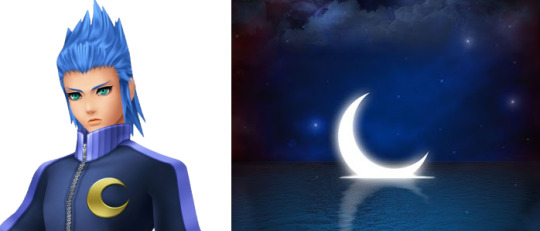
Cool, collected, and mature beyond his age. He’s good friends with Lea.
— Jiminy’s Journal (Kingdom Hearts Union χ)
Saix’s title, Luna Diviner, is a reference to Selenomancy, named after the Goddess Selene. It is a specialized form of divination that examines the various aspects, phases, and appearances of the moon. According to diviners, moon phases are associated with certain personality types at the time of birth. There are several specific moon phases used as names for Saix’s weapons. Gibbous represents someone who is a healer and humanitarian. They care about other people; sometimes more than themselves. The pain and suffering of others is something that they are not only highly sensitive to, but also want to help transform.
Balsamic Moon, is the waning crescent that is the trademark symbol on Isa’s jacket. It’s the final phase of the moon. This is a phase of decline and darkness—a rich opportunity for your soul to experience. It is considered the most Yin or Feminine phase. Balsamic means soothing or restorative. If you are born under this Moon, you will be aged and mature in some way. Balsamics are quiet, retiring and resilient; they are often seen as “old souls”. They are complex and wise beyond their years, as well as loners who usually only enjoy the company of a select group of people.

New Moon is also known as the Dark Moon. It is the phase where the Moon’s energy is weakest. Even though the New Moon is invisible in the sky, those born under it are cloaked in darkness. They tend to lack self-awareness. They may be known for being selfish, callous, or unable to see things from other people’s perspectives. This weapon has the same shape as Berserker and Werewolf.
Saix’s Pandora Gear is Dichotomy. This word has several definitions. It means “a division or contrast between two things that are entirely different.” Or, “the phase of the moon in which half its disk appears illuminated.” It represents the clear division between the past and the present, Isa and Saix.
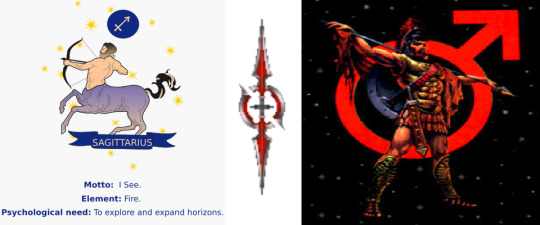
Many of Saix’s weapons incorporate ♐︎ the astrological symbol of Sagittarius into them. I believe ♐︎ is meant to represent Lea. Sagittarius is a part of the Fire Trigon of the Zodiac. As an archer, he is said to never fail in hitting the mark. Sagittarius represents the centaur Chiron, an immortal centaur, who was renowned for his gentleness. After being accidentally shot by a poison arrow, he was in agony, but unable to find release in death. So he decided to offer himself as a substitute for Prometheus, who was punished by the gods for giving fire to man. Zeus saw the kindness of Chiron and immortalized him in the stars.
Axel’s weapon Prometheus is a combination of ♐︎ and the symbol of Mars ♂, and ALSO ♋ the Cancer symbol. Mars was known as the Roman god of war. He was said to love the violence and conflict. He carried a spear that was often depicted as covered in blood. He was the patron God of soldiers and was worshiped prior to battle. Soldiers in the Roman Army prayed to Mars before battle, hoping that he would protect them and lead them to victory.

Selene is shaped like a torch combined with ♐︎ the symbol of Sagittarius. In ancient Greek mythology, Selene is the Titan goddess of the Moon and is said to drive her glowing chariot powered by beautiful white horses across the sky each night. Her symbols were the crescent moon, a chariot, and a torch. Selene was very well known mostly because of her beauty. She was a very peaceful goddess and did not approve of war. Her personality was said to be secluded and timid.
Most Ancient Greeks looked to her for healing. Selene also had many powers that you would not think a moon goddess would have. Mythology states that she had powers surrounding dreams, she could harness the ability to awaken intuition and she could also catalyze psychic visions. As the patron of femininity, she was known to have the power to ease childbirth, to inspire love, to mask reality, and to pierce illusion.
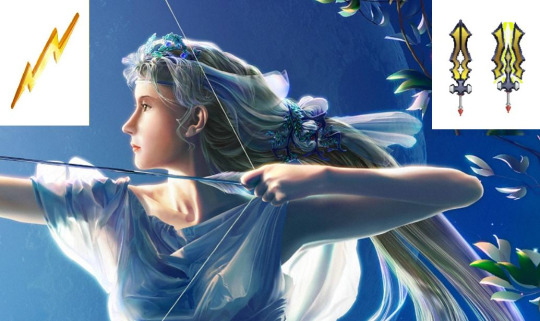
Artemis has been commonly associated with Selene. She was the goddess of the Moon, the ruling planet of Cancer, and the daughter of Zeus. Her personality was individualistic and free-spirited, yet kind. She was a patron goddess of hunting and childbirth, and she was also the protectress of little children and baby animals. In Greek mythology, Artemis was usually portrayed as a very tall, beautiful young maiden with a hunting bow the shape of a crescent moon and golden arrows. She is often accompanied by either a stag or a dog. One of her special talents is calming animals, meaning that when she walks near them they come towards her and become calm.
Artemis is one of the ‘virgin’ androgynous goddesses, along with Athena and Vesta. Due to her well-integrated masculine energy and independence, she possesses an introverted temperament, preferring solitude. She was also known to be friends with mortals. Her assets were courage, confidence, and strength (both mental and physical). Her weaknesses were vengeance, impulsiveness, and being quite aloof. She was afraid of men, which is why she used to live in the woods and only went for walks at night. She rarely had any male companions; she only loved one person, Orion, but she ended up unintentionally killing him due to trickery. In her pain she appealed to Zeus to immortalize Orion in the stars so she could be with him.

A quiet and cool-headed youth. Though he does come out of his shell when talking to his best friend Lea, toward others he is distant and untalkative. Often scolds Lea and his contrasting personality.
— description from KHBBS Light Novel 2 (Best Friends)
The design for the weapon Astrologia incorporates ♋, the sigil of Cancer into its design. Cancer is associated with Artemis, who is similar to people born under the sign of Cancer. They are very modest, shy, and extremely emotional individuals who love children and pets. Artemis exemplifies the caring, nurturing and protective qualities of the mother. Deeply intuitive and sentimental, Cancer can be one of the most challenging Zodiac signs to get to know, but they are sympathetic and very attached to the people they keep close.
Being ruled by the Moon, they are mysterious— they can struggle with sharing their innermost feelings. Cancer was known as the “dark sign” because of the obscured visibility of its constellation in the night sky. They have a tendency to brood and can be very moody and pessimistic. They often don’t have enough coping and defensive mechanisms for the outer world, so they can be prone to introversion and slow to warm to strangers. Cancers are quick to retreat into their shells if it suits their mood. The crab is a perfect symbol for the Cancer sign, symbolizing how a sensitive soul hides beneath a tough exterior.
A Cancer is caring and vulnerable, however callous they may appear on the outside. They are introspective and serene folk, who love solitude yet care gently for the people surrounding them. This receptive nature, however, makes them easily hurt. Cancer is the most emotional sign of the zodiac but at times they might appear icy and separated. Empathy for others is likely to be strong, and they will have an intuitive ability to sense what others need. They have a tendency to be quite clingy. Cancer’s shyness comes from their insecurity and deep fear of rejection. They are a cautious and shrewd people.
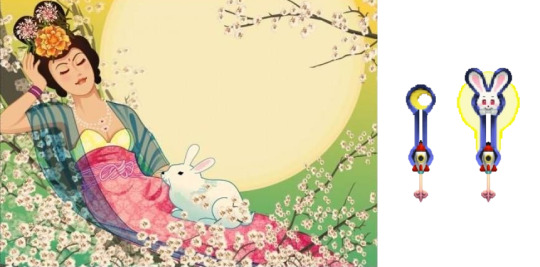
Moon Rabbit is known as the Jade Rabbit in China. The Jade Emperor disguised himself into a poor, starving old man and begged for food from monkey, otter, jackal, and rabbit. Rabbit could only gather grass. Knowing well enough that grass can’t be offered as food to humans, rabbit decided to offer its own body, sacrificing itself in the fire the man had started. Somehow, though, rabbit wasn’t burned. The old man suddenly revealed himself to be the great Jade Emperor. Touched deeply by rabbit’s selfless sacrifice, he sent it to the moon to become the immortal Jade Rabbit.
More than just cute, fluffy, and white, the Jade Rabbit is a sign of selflessness, piety, and sacrifice. The Jade Rabbit is on the moon so that no matter where we are on Earth, we always have the ethics of righteousness and self-sacrifice to look up to. In East Asia, the Jade Rabbit is a widespread cultural symbol. When the bunny isn’t busy making immortality elixirs, it keeps the beautiful goddess Chang’e company in the Moon Palace.
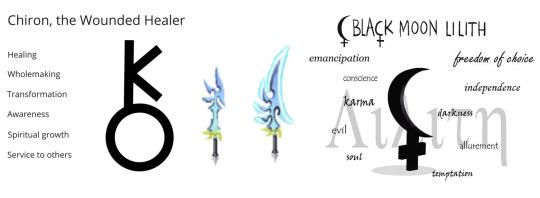
Saix’s weapon Crescent is based on the Phoenix’s wings. This weapon represents the albedo stage of magnum opus. Following the chaos of the nigredo stage, albedo involves the washing away of impurities. In this process, the subject is divided into two opposing principles to be later coagulated to form a unity of opposites during rubedo. The aura is light blue, meaning truthfulness and serenity.
Psychologist Carl Jung equated the albedo stage with “unconscious contrasexual soul images; the anima in men and animus in women”. Jung described the animus as the unconscious masculine side of a woman, and the anima as the unconscious feminine side of a man, with each transcending the personal psyche. This makes albedo a phase where insight into the shadow side of the self is gained, while inflated ego is removed from the psyche.
So, that makes it VERY interesting that the weapon has a similar shape to ⚸. Even if they never planned to actually show it explicitly, the writers seemed to be inspired by Black Moon Lilith. Which raises very disturbing (though very interesting) implications about what happened during the experiments on the “darkness of the heart”. It would certainly explain how Axel’s personality became so warped. It would also explain why he didn’t find Saix’s personality change that unexpected, either, and why Axel seemed to always give him the benefit of the doubt no matter how cold he was.
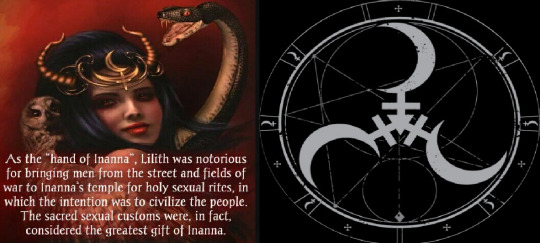
Astronomically, Lilith is considered an asteroid. Yet, some astrologers identify Lilith with the “Black Moon”. It’s the mathematical point that’s exactly in between the earth and the moon–essentially, empty space. Astrologically, it represents the cosmic void; the very energy Black Moon Lilith embodies. Psychologically, it is a point that represents how we react to emptiness and isolation. It brings up deep and primal issues like repressed feelings of rejection, rage, and the refusal to give in. This particular archetype is associated with sex, death, obsession, addiction, transformation, resurrection, magic, the occult and the taboo. These things are seen as the entry way between the spiritual dimension (or the underworld), and life on the physical plane.
Put simply, Lilith is the dark side of the moon. She represents animus, the feminine shadow side—What society rejects as appropriate for the feminine, Lilith takes up. The vilest manifestations of sexuality like pedophilia, rape, and satanic ritual abuse are all the domain of Lilith. She was actually said to be a hermaphrodite, so she could act as both a succubus and an incubus. Trauma based mind-control, through the use of sexual torture is another area connected with Black Moon Lilith. She symbolizes the transformation that occurs after going through a dark night of the soul. Usually, the trigger is great suffering, mourning, pain or torture. I can only imagine what poor Lea and Isa must have gone through.
Astrologically, Chiron (Sagittarius) stands in total opposition to Black Moon Lilith and all she represents. He is a symbol to remind us to look at the vulnerabilities we face in light of our connection to Divinity. Through the exploration of our wounds, we are called to heal all that creates a rift or disconnection with our Spirit.
#kh lea#kh meta#kh isa#kh#kingdom hearts meta#anti-kh3#kh saix#kh 358/2 days#isalea#akusai#kh akusai#kh leaisa#leaisa#kingdom hearts#kh theories#kh axel#kh isalea
58 notes
·
View notes
Note
Forgotten First Meeting + Fake Dating (random hates me): Steelponcho
Okay, this was an AU ask and this isn’t exactly an AU but the ideas this prompt gave me were too cute to pass up. So I ended up writing an actual fic. Set some time between Vanguard Discipline (NSFW LINK) and Battlegrounds. Hawthorne and Zavala have a ‘meeting’ which may or may not be a date. Zavala has a sense of fun! Hawthorne drops a clanger! Izanami knows what’s up!
SFW | Fluff | Romance |Humour | Pre-relationship | Zavala x Hawthorne |
By rights, the restaurant shouldn’t have been re-opened yet. One wall was missing, black scorch marks on the floor telling the tale of the Red Legion blast that had blown it away. The furniture was mismatched; some of it original but much of it had been padded out with pieces scavenged from other sources. The owners had done their best to dress the space up by bringing in potted plants and hanging strings of fairy lights around the room. The effect was oddly charming and Hawthorne was surprised that Zavala would pick somewhere with such a bohemian flavour for their meeting.
Hawthorne picked at her food and looked around at some of the other patrons in the restaurant while Zavala opined, something about City, about how devolving responsibility to autonomous cells reflected something in the Vanguard strategies for something, something, City. She caught people making furtive glances at them, some who were outwardly staring only to suddenly become very interested in their own meals when they realised she was staring back. She sighed, picked up her glass and quaffed her wine as though it were water then finally picked up on what Zavala was saying.
“So yes, I was thinking of reshading my armour hot pink and Shaxx mentioned that he was replacing the objective in Rift matches with a piñata containing pure arc energy…”
Hawthorne frowned in confusion and said, “What?” Zavala responded with an elegantly arched eyebrow. “Oh. I…I’m really sorry, I wasn’t listening.”
“Evidently,” He said, picking up the wine bottle to top up her glass. “Something wrong?”
“No, I just,” she tailed off, her eyes darting to the side again. “People are looking at us.”
“So?” He shrugged. “Let them look.”
“So…I don’t know…” She cass her gaze around the restaurant, taking in the strings of lights, the delicately prepared food, the candle in the centre of the table. She leant forward and looked him in the eye. “Is this a date?”
Zavala just stared back for a moment. “No. This is work. I just thought this would be more pleasant for you than an office or board room.”
“It kinda feels like a date.”
“If I had intended for this to be a date, I would have told you.” He folded his hands on the table and looked at her seriously. “Would you like it to be?”
Hawthorne froze, just staring back at him like a deer caught in headlights. “Uhm, I don’t know,” She stammered and suddenly became very aware that the colour in her cheeks probably matched the hue of the rosé that Zavala started topping her glass up with. “I’ve never really, I mean, uhm…”
“Take your time,” Hawthorne waited for him to finish pouring the wine then drank gratefully.
“I guess,” she paused, choosing her words carefully, “It could be interesting, I never really did the dating thing before. Never got along that well with the people I went to school with, then I went off into the Wilds and that’s not really the best set-up for long-term relationships, so…” She shrugged. “That’s it. Never bothered with it.”
“Being Vanguard Commander isn’t exactly conducive to long-term relationships either.” Hawthorne, watched him carefully, wondering if there wasn’t some disappointment creeping into that usually steady baritone of his. “Let’s play a game.”
“Say what now?”
“How would a date go if I weren’t a Vanguard Commander you weren’t a rebellious survivalist?”
Hawthorne frowned, considering the proposition. “You mean like a pretend date? What for?”
“For fun,” he said, the seriousness of his voice belying what he’d just said.
Hawthorne gasped. “You said the ‘F’ word,” she breathed in a scandalised whisper.
“It does happen occasionally. Once every century or so,” Zavala replied, still so matter of fact.
Hawthorne shrugged and said, “Okay. Why not?” She reasoned that a pretend date was a much safer option than a real one. “So, we just met, right?”
“Correct.”
“So,” she picked up her wine glass, “Tell me about yourself, what do you do?”
“I’m a librarian.”
Hawthorne responded with a decidedly unlady-like snort into her wine. “A librarian?” She coughed, trying to compose herself. “How is that, do you like it?”
“I love it. The peace and quiet. Surrounded by books.” He sighed happily, “And the organisation…”
“I’ve never seen anyone get so misty-eyed over the Dewey Decimal System before.”
“It’s good to take pride in one’s work. What about you?”
A brief silence ensued while Suraya considered what path her life might have taken if she hadn’t left the City. She eventually answered in an emphatic, even voice. “A veterinarian.”
“Really?” Zavala cocked his head. “What made you want to do that?”
“It lets me use my brain, it’s useful and…” She stopped short of saying, it’s not what my parents would have chosen for me. “Animals are better than people.”
Zavala laced his fingers together and rested his chin on his hands. “Should I be offended by that?”
Suraya laughed, “No, an individual person can be all right, but People? As an entity?” She glanced around the restaurant. The other diners were still surreptitiously watching them, probably intrigued by the idea of the oh so stoic Vanguard Commander reducing the new Clan coordinator to fits of giggles. She started counting off with her fingers, “They’re stupid. They’re nosy. They’re obsessed with status and possessions. And they’re noisy.”
“Oh they’re not as bad as all that, surely? I read somewhere, I read a lot, because as I mentioned,” he paused for effect, “I’m a librarian.”
Suraya bunched her fist and hid her smile behind it. “Mm-hm? What did you read?”
“It’s often assumed that humans are inherently selfish but it turns out that in times of crisis, they don’t turn on each other, they cooperate. That suggests People, as an entity, are naturally altruistic, not selfish.”
“Is that so?”
“Maybe it’s an evolutionary hold-over, from when we were primitive apes living in the trees, when communities had to get along for survival’s sake. Whatever the reason, give people a chance. They might surprise you.”
“Can you cite examples, Mr. Librarian?” Suraya smirked.
“Well.” He cast his gaze heaven-wards as if thinking it over. “I did hear about this woman, who set up a safe haven for refugees during the war, ran interference on the Red Legion, got communications re-established, organised the survivors into clans so they’d work together efficiently. She didn’t need to do that. She’s clearly a survivor, she could have hid out the war in the wilds. But she chose to help. Strikes me as admirably selfless, no?”
Suraya studied him, beginning to discern things she’d never seen before in that seemingly impassive face; An amused twitch of the lips , a playfully raised eyebrow and something to do with his eyes. The light in them seemed different somehow, betraying an emotion that Suraya didn’t have the courage to name yet. “Is this still a pretend date?”
“What are you talking about?” Zavala asked in a deadpan tone. “We just met.”
Suraya drained the last of her wine in an attempt to drown the swarm of butterflies in her stomach. “If you say so.” She grinned wickedly and said, “But…This actually isn’t the first time we’ve met.”
Zavala frowned in confusion. “What do you mean?”
“We’d met before. Before the Farm.”
Zavala narrowed his eyes, “Are we still pretending or…”
“No, this is real.” Suraya answered brightly, probably the wine giving her the courage to tell this story. “I didn’t know who you were at the time but yeah, we’d met. I would have been about twelve? Thirteen?”
Zavala dropped his hands down to the table and stared. “You’re joking with me.”
Suraya shook her head. “Nope. It was one of Cayde’s dodgeball tournaments, you know? Getting civilians to interact with guardians or some such nonsense. Well. You came down, I don’t know why. Knowing what I know now, Cayde was probably shirking his duties or not answering calls, something like that.”
Zavala was sitting bolt upright, staring at the table cloth, looking distinctly uncomfortable. “I don’t remember. I’m not sure how to feel about this.”
Suraya laughed, “Oh come on, we always knew there was an age gap. How old are you, anyway?”
Zavala answered with a single, forceful syllable. “Old.” He cleared his throat, “So. Dodgeball. You were playing dodgeball?”
“Yeah,” she started fidgeting with her napkin, beginning to regret diving into the anecdote but realising she was in too deep to stop now. “You came across me and…” She paused. “I was crying.” Another pause. “Because the other team won.” She staged a laugh to hide her embarrassment, “I know it’s silly but it was a big deal to me at the time. I was a smart kid and I was expected to be good at whatever I did so if something didn’t work out I used to melt down. Didn’t know how to handle failure. It wasn’t supposed to happen.”
Zavala was looking at her again. Suraya caught his gaze for a moment before looking away again. His eyes were shining with sympathy and also that unnameable emotion again, only even more intensely than before. “Did we speak?”
Suraya nodded, “Yeah, you asked me what was wrong. You looked pretty mean, I thought you were going to tell me to stop being silly, that it was just a game or something but you didn’t. You asked me if I tried my best, I said I had. Then you said that losing might sting but giving your best is always something to be proud of.”
Zavala gave a shrug. “I still don’t remember. It does sound like something I would say, I suppose. Did it help?”
“Yes.” She plucked up the courage to look him in the eye. “You made me feel good about myself.” She clutched the napkin on her lap in her fist and felt her mouth go dry suddenly but she somehow managed to carry on speaking. “You still do.”
“Suraya, I-” Zavala was cut off by his Ghost appearing at his shoulder.
“Sorry to interrupt your definitely not a date, Commander but Ikora is asking for you in CIC. She says it’s urgent.”
Suraya exhaled slowly, not sure if she was glad of the interruption or not. “Some sort of librarian emergency?”
Izanami turned her optic to face her. “Someone shelved Chicken Soup for the Soul in Cookery.”
She sucked her breath in through her teeth and made and exaggerated mock-wince. “Oof. You’d better get going. I’ll get the bill.”
“I’ve been talking to the restaurant’s Point of Sale computer, I already transferred the glimmer,” Izanami explained. “Zavala always pays on the first date.”
“It’s not a date,” Suraya insisted.
“Of course not. You’re just sitting in an expensive, artfully-lit restaurant giving each other compliments but it’s not a date.”
Suraya looked horrified. “How expensive? I can pay!”
“That’s enough, Iz,” Zavala said, a warning undertone in his voice.
“Shutting up now, Sir.”
“Sorry to cut this short,” Zavala rose from his chair.
“It’s okay. We’ll talk tomorrow.” She smirked up at him. “Cradle-snatcher.”
Zavala glared but there was a hint of a smile playing on his lips. “Good night, Suraya.”
She watched him leave, only becoming aware of how much her heart had been hammering in her chest as she felt it finally calm and slow. She tapped her fingernails on the stem of her glass, thinking over everything they’d said to eachother. When the server came to clear their plates she said, “Could I have another glass of wine? Large, defintely large. Start a tab.”
31 notes
·
View notes
Text
Cannibalistic moths help scientists understand how extreme selfishness evolves
https://sciencespies.com/nature/cannibalistic-moths-help-scientists-understand-how-extreme-selfishness-evolves/
Cannibalistic moths help scientists understand how extreme selfishness evolves
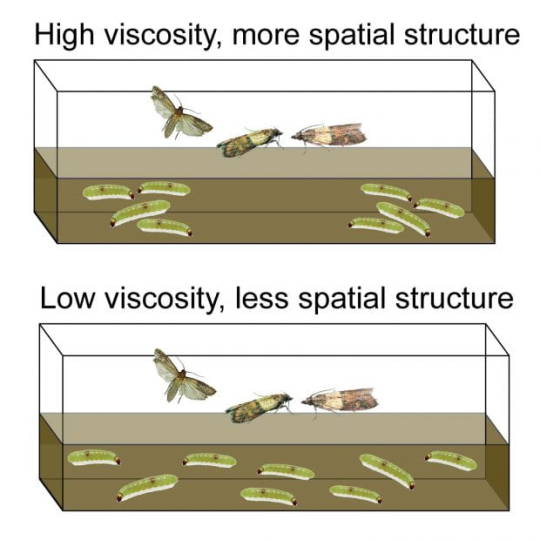
Scientists have figured out a way to stop cannibalistic moths from selfishly eating their siblings. All that’s required is the space to get to know one another.
The Indian meal moth, or the pantry moth (Plodia interpunctella), is usually a voracious vegetarian, chowing down on flours, cereals, rice, and other packaged foods as a young caterpillar. However, if there’s not enough nutrition around, or if there are too many moths in the brood, these larvae can sometimes turn on one another, feasting on both strangers and relatives alike.
That’s some brutal survival behavior, but new research suggests this moth-eat-moth mentality is not inherent to the species. Under friendlier conditions, these insects can be quite neighborly.
When researchers directly manipulated the spacing of five moth populations, they found more cramped conditions led to far less cannibalism in just ten generations.
“Families that were highly cannibalistic just didn’t do as well in that system,” says biologist Volker Rudolf from Rice University.
“Families that were less cannibalistic had much less mortality and produced more offspring.”
The findings support a previously untested theory behind the evolution of social behavior. A team of researchers – including Rudolf and the moth study’s first author, Mike Boots, a biologist at the University of California, Berkeley – suggested that when animals interact more, the rate of cannibalism decreases. That’s because the chance of encountering and eating your kin is statistically more likely in a denser cluster, and in the end, that would be disadvantageous.
In short, the closer a family unit, the less likely they are to kill one another.
The new microevolutionary experiment puts this theory to the test.
In the early stages of this particular moth’s life, caterpillars live and grow in their food, so the authors decided to limit the larvae’s ability to disperse by creating five different food viscosities of equal nutrition. Practically, this meant that some conditions were easier for caterpillars to move about in, while other environments were stickier and led to less movement and more interactions between individuals.

(Rudolf/Rice University)
Above: The sealed enclosures where meal moths were raised either included sticky food (top) or food that was easier to move through (bottom).
After 10 generations, researchers compared the rate of cannibalism in each group. In cases where dispersal was limited by stickiness, the extreme selfish behavior of cannibalism significantly decreased over time.
“Because they’re laying eggs in clusters, they’re more likely to stay in these little family groups in the stickier foods that limit how fast they can move,” says Rudolf.
“It forced more local interactions, which, in our system, meant more interactions with siblings. That’s really what we think was driving this change in cannibalism.”
In this scenario, it seems the cost of cannibalism outweighs the benefits. Eating another moth might decrease competition and provide nourishment, but in cramped quarters it’s more likely that a caterpillar will eat its sibling. Devouring kin can undermine the continuation of their shared genes if it happens enough.
Over time, those moths with more cooperative impulses were the ones that survived in a stickier substance.
Whether this finding holds for other species remains to be seen, but the authors say their results imply a “considerable potential” for nature to select against selfish behavior.
Natural selection is often described as an intrinsically selfish force, but this doesn’t necessarily mean there aren’t benefits to cooperative behaviors under certain conditions. Some signs of this have already been seen in yeast and bacteria when their spatial structure is changed. There is also some evidence parasites are less virulent to their hosts when dispersal opportunities are limited.
A similar situation could even occur between humans.
“In societies or cultures that live in big family groups among close relatives, for example, you might expect to see less selfish behavior, on average, than in societies or cultures where people are more isolated from their families and more likely to be surrounded by strangers because they have to move often for jobs or other reasons,” explains Rudolf.
For decades, evolutionary biologists have been fascinated by selfless behavior and how it arises in the animal kingdom. Extreme forms of selfish behavior, however, have been relatively overlooked.
Rudolf has spent decades trying to change that, and his new research on moths just goes to show how important cannibalism can be in the dynamic evolution of animals and their interactions and behaviors.
It’s worth finding out more.
The study was published in Ecology Letters.
#Nature
0 notes
Text
Theory Of Motivation In Mordern Company

Here is the total note on "Exactly what is Inspiration" and "Theory Of Motivation In Mordern Company"
INTRODUCTION
Motivation is the driving force by which we attain our goals. Motivation is said to be intrinsic or extrinsic. Inning accordance with different theories, inspiration might be rooted in a standard have to decrease physical pain and take full advantage of pleasure, or it may consist of specific requirements such as consuming and resting, or a wanted object, goal, state of being, ideal, or it might be associated to less-apparent reasons such as selflessness, selfishness, morality, or preventing mortality. Conceptually, inspiration needs to not be puzzled with either volition or optimism. Inspirationis associated with, but distinct from, emotion.In spite of enormous research study, the subject of inspiration is not plainly comprehended and usually inadequately practiced. To understand motivation one should comprehend human nature itself. And, there lies the issue! Human nature can be extremely easy, yet really intricate too. Rather apart from the advantage and moral value of an altruistic approach to dealing with coworkers as people and appreciating human dignity in all its kinds, research study and observations show that well encouraged workers are more efficient and innovative. They will do exactly what they desire to do, or otherwise encouraged to do. Whether it is to excel on the workshop floor or in the' ivory tower'they need to be encouraged or driven to it, either by themselves or through external stimulus. Which are Positive support or high expectations, Effective discipline and punishment, treating individuals fairly, Pleasing employees requirements, setting work related goals, restructuring jobs, Base rewards on job performance.Although these are the standard techniques, the mix for the final' recipe'will vary from work environment scenario to situation. Inspiration, in result, is a way to reduce and control this gap. It is inducing others in a specific method to goals specifically specified by the incentive. Naturally these objectives, as likewise the motivation system , must adhere to the corporate policy of the organization.Among numerous inspiration theories that have actually been accepted by American organisation are those of Frederick Herzberg and Abraham Maslow. Herzberg, psychologist, proposed a theory of job aspects that inspires employees. Maslow, behavioral scientist and contemporary of Herzberg's, developed a theory of different human needs and how individuals pursue these requirements. Maslow's'Hierarchy of Requirements Theory'is typically represented in the shape of a pyramid, with the biggest and most basic levels of needs at the bottom, and the need for self-actualization at the top. Herzberg proposed the 'Motivation-Hygiene Theory', also called the' Two-Factor Theory'of task satisfaction. Inning accordance with his theory, people are influenced by 2 sets of aspects; motivator factors and health factors.Motivated staff members always try to find much better ways to do a job.Motivated employees are more quality oriented.Motivated workers are more productive.There are resemblances between Herzberg's and Maslow's designs. They both recommend that needs need to be satisfied for the staff member
to be inspired. Herzberg argues that just the greater levels
of Maslow's hierarchy (e.g., self-actualization, esteem
requirements)serve as an incentive.
The staying needs can only cause dissatisfaction if not resolved. In Maslow's theory, he recognized five sets of human requirements(on top priority basis)and their complete satisfaction in encouraging employees. Hertzberg refers to hygiene aspects and encouraging elements in his theory. Maslow's theory is rather easy and descriptive. The theory is based on long experience about human requirements. Hertzberg's theory is more authoritative, andit suggests the encouraging
factors that can be utilized efficiently. these aspects are; Need for accomplishment; drive to excel.Need for power; desireto triggerothers to behave differently.Need for affiliation; desire for friendly and close interpersonal relationships.The significance of each ofthese requirements will vary from a single person to another. If you can determine the significance of each of these needs to a private, it will help you choose ways to affect that individual. David McClelland thought that employees could not be motivated by the simple requirement for cash-- in reality, extrinsic motivation (e.g., money)might extinguish intrinsic motivation(e.g., achievement). Money might be utilized as an indicator of success for different motives
(e.g., keeping score ). A motivated employee is somebody that works hard since they feel satisfied when they do so. Motivation is an important area of organisation research and throughout the years there have actually been numerous'motivational theories'. One of the best-known theories of inspiration is based upon Abraham Maslow's hierarchy of requirements. Maslow argued that people have a hierarchy of requirements. True inspiration is achieved by fulfilling greater order needs. These requirements are; Standard needs This requires Are for reasonable requirements of food, shelter and clothing
and those other items which are required to be the norm to satisfy the needs of the body and for physical survival. The base level of need will be generally satisfied in contemporary industrial society by the exchange of labour for a wage packet or salary.Security needs These also interested in physical survival. In the context of the office these requirements could include physical safety, security of employment, adequate pause, pension and ill plans, and protection from approximate
actions.Group needs
This handles a person's need for love and love. Most of people want to feel that they come from a group.Self-esteem These Requirements are based on a person's desire for self-esteem and the respect of others. Staff members have a need to be acknowledged as people of some significance, to get praise for their work, and to have
their efforts noticed.Self-fulfillment Maslow put self-fulfillment at the top of his hierarchy of requirements. Self-fulfillment is interested in complete personal development and specific creativity. In order to meet these needs it is crucial for individuals to be able to utilize their talents and abilities totally.
The organization that desires
inspired staff members need to pay due care and attention both to lower and higher order needs.According to the work of Frederick Herzberg complementsthat of Maslow. Herzberg showed that to truly motivate a worker you require to create conditions that make them feel satisfied in the work environment. Herzberg set out a crucial distinction in between 'movement'and' motivation'. He stated that you can get utilizes to move by' begins the ass'-- i.e. penalties and benefits e.g.charges for bad
work and high pay for excellent work. However, workers that move are not the very same as workers that are motivated.According to Herzberg if you want to inspire workers you need to create a series of'satisfiers'which are rather different from high pay. Herzberg's satisfiers consisted of: Acknowledgment of effort and efficiency The nature of the task itself-- does it supply the staff member with the appropriate degree of obstacle and enjoyment?Sense of accomplishment Responsibility The opportunity for promotion and improvement.THE SIGNIFICANCE OF MASLOW AND HERZBERG THEORY OF INSPIRATION IN MORDERN ORGANIZATION The concepts of Maslow and Herzberg have actually been constructed on in contemporary theories of Human Resource Advancement. Personnel Development involves speaking with staff members to learn about their requirements and goals so regarding be able to develop Training and Development Plans. Human Resource Development recognizes that not only do organizations have objectives and requirements, so to do the people that work for them.
Strategies such as empowerment i.e. relying on employees to believe for themselves and to make choices rather than be informed exactly what to do, and career advancement plans offer genuine motivation for employees. Both theories provide that a particular
set of requirements need to be satisfied in order to propiciate habits, and maintain it. In Maslow's theory, it is through a Hierarchy of Requirements.
In Herzberg's theory it
is through a 2 way
paradigm in which 2 particular requirements must be met and
they are health (standard physical and psychological needs)and motivation.The main difference is that Maslow
is more particular in terms of categorizing the locations of human requirement and consists of less concrete areas such as feelings and other sensations. Herzberg is more specific in exactly what physiological and concrete things should be present to produce motivation. Also, Herzberg's ultimate objective is for inspiration to be the prevailing mindset amongst people(quite plainly a need for a good quality of life ), while Maslow's primary goal is for needs to be fulfilled in order for a specific to establish in a healthy mental and physical method. Both uses a hierarchical scale. Where one stage must initially be completely or mostly finished prior to advancing to the next stage. Both are based upon the argument that"we behave as we do due to the fact that we are attempting to fulfill internal needs. "( Bartol et al., 2005) i.e. requires theory. They both define the requirements regarding what motivates people. This is questionable due to the fact that business owners and individuals from different cultures have various worths and norms, and therefore have various requirements or have requirements which are perceived as more essential e.g. Greek and Japanese workers mentioned that safety and physiological needs are more crucial to them, where as staff members from Norway and Sweden saw belongingness requirements as being more important.CONCLUSION Herzberg's health concept refers Maslow's Physiological, Security and Belongingness requires i.e. they both have the exact same requirements(basic pay, work conditions etc.Also, Herzberg's motivator's concept refers Maslow's Esteem and Self-Actualization needs i.e. they both have the exact same requirements(acknowledgment, growth, achievement etc). Both theories are influenced by ecological conditions, employee attitudes and as a result, their motivation. These affect an employee's performance.Maslow states that each phase of the 5 must be fully or mostly finished before advancing to the next stage. Nevertheless, Herzberg recommended that there were just two phases(health and incentives )instead of five.Maslow stated that satisfying each phase is an incentive; nevertheless Herzberg stated that satisfying the hygiene phase just results in a staff member being in neutral state and that fulfillment and inspiration only originates from the 2nd phase( incentive). Share Pin 0 Shares
0 notes
Text
My guess at how ancient werewolf culture handled what Noblesse calls ‘authority’ is that who can beat who in a fight is no basis for a system of government. So either werewolf society was always a complete crab bucket mess or that wasn’t actually how it worked, in the same way the Noble Lord doesn’t take power because they’re the smartest by scheming ala Maduke, but they’re entrusted with power by the people because they’re considered the best for the job.
So... assuming that the werewolves are reasonably intelligent people when not brainwashed by fascism, what would make ‘the strongest’ the best for the job? And not simply the best, singular, but ‘werewolf warriors’ as a social class?
Normally in functional societies, the military does not rule because you can’t run a society like a military for the same reason you can’t have conventional forces do police work, and you can’t run a military like a civilian society for the same reason - people die. People tend to apply the problem solving methods they know and someone trying to use bits of both methods would suck at both, so ‘the people that run the military’ and ‘the people who run the society’ tend to become different people because the difference specializing like that makes is very dramatic.
Maduke’s rise to power is evidence of that, really - Muzaka has the skillset and mindset of a werewolf warrior, but that is not what you need to run a society. The Previous Lord gives Muzaka a ‘the reason you need to get your act together’ speech about how even given what Muzaka thought was going on, his actions were not what a ruler would owe his people in the circumstances Muzaka thought pertained. In other words, even if Maduke was telling the truth, Muzaka was still being an incompetent ruler and his people would have a right to depose him - so it’s canon that Muzaka sucked at his job, the question is that since we the reader know he wasn’t just irresponsible, either A. he was just dumb or B. he was a trained werewolf warrior and that was not the philosophy needed to be a competent head of state.
On the other hand, Maduke is equally incompetent as a warrior - his idea of how to get stronger is discussed by two (or three) different veterans as actively making the subject weaker because that’s not how it works. Despite being very good at what he does, Maduke makes just as terrible a warlord as Muzaka does a president. So Maduke is evidence that Muzaka being a fail politician doesn’t mean he’s not good at what he was trained to do - and then we get the current werewolf arc, which is the kind of action you’d have military doing, and suddenly Muzaka is badass... until confronted with Maduke moving the battleground to public opinion, where he’s once again incompetent.
I’d say that what happened is likely a change in the werewolves’ environment. Muzaka inherited a social model adapted to a certain set of circumstances, but something major happened - possibilities are the withdraw of the nobles and Rai’s brother - that made that ‘rule by warriors’ model no longer optimal because again, warriors suck at running civilian societies. The necessary approaches to each are completely incompatible.
Soooo... Why were the pre-Muzaka werewolves willing to be ruled by warriors despite the fact that warriors should not be making decisions for civilians outside wartime?
If they were at war.
However, who would they be at war with? Especially when the nobles seem to have viewed werewolves as a ‘police action’ matter - sometimes a problem, but never an actual threat. The only humans able to fight werewolves would have been contractors, too.
Then I start eyeing Gejutel, because the Landegre clan fighting style as described is terrible against nobles and only makes sense if it was developed as an anti-werewolf combat style.
Why would the ancient werewolves keep attacking human villages even with nobles there? Especially if they were on a wartime footing and that seems like an excellent way to pick a fight with a noble and die.
After this point a lot of it devolves into guesswork of the ‘given canon, that implies this, very strongly, so why the heck would this have come about?’
Whether it was territory or they had some reason they needed to eat humans (I’ll skip the ability spec), posit that the werewolves thought they had no choice but to attack human villages and their noble protectors.
Humans don’t like being eaten, and nobles didn’t like watching humans being eaten, so this becomes a major impetus for more contracts. Over time, humans get better and better at fighting off werewolves, and in terms of raw power, nobles used to beat werewolves.
Also humans are better hunters than werewolves I’m assuming, because tactics - see Frankenstein.
So, the werewolves had to organize too. But more than that, they had to train, because that was the only way to get good enough to deal with an enemy constantly getting stronger and constantly throwing new tactical surprises at them.
So you get a specialized warrior caste and a greatful populace of the ‘you saved my life’ persuasion.
We’re told that werewolves are by nature solitary.
However, an organized force is never outnumbered by an unorganized force. In order to not die against humans, werewolves would have had to work together and that would have required beating Leeroy Jenkins/lone wolf tendencies out of each other. Training for teamwork, putting the survival of the people over the individual... anyone who thinks they’re above the rest of the team is putting everyone in danger, so I’m betting uppity people got ditched on the battlefield before the rest of the warriors got dead.
So you essentially end up with warrior monks, dedicated to training because otherwise they die, very smart because they have to be able to think in their feet or die, and more selfless than a very individualistic species because otherwise they die...
And everyone else going ‘I owe you my life’ to these people, meaning they have a lot of popular support if they speak up at the enclave, or see a need to call in favors. I suspect the urge to micromanage other werewolves was suppressed by the need to be constantly training and peer pressure/the development of the way of life/ideology.
Not saying there weren’t jerk werewolf warriors, but no matter how strong they were they weren’t going to be able to win without help, and if they didn’t keep winning then people wouldn’t keep giving them obedience... Or, you know. The enemy killed them.
I’m drawing on Kentas’ decent traits a lot for this, because he was raised in a very toxic environment, so there must be a source for a lot of the ideas he has.
‘I did you a favor because you saved my life - if you want another favor, you’d better save my life again.’ Werewolf warriors who didn’t help the tribe had no pull. That creates a system with enough checks to not break down, that works well enough that people would keep going with it.
Now, werewolf lord. On the face of it, a terrible idea. Can’t run a stable society that way, especially among immortals. You’d think it would be a joke/token authority well before Maduke came along, so how the heck did Muzaka get the idea that his authority was absolute and people would just do what he said?
Maybe because there used to be a reason the werewolf lord got that kind of instant obedience?
The werewolf lord is supposed to be available to any werewolf who wants to challenge them, right?
And werewolves, from what we see in canon, get stronger when they’re pushed to their limits fighting to survive.
Unexpected power-ups on the battlefield are a great way to die due to suddenly not knowing what you’re doing, but if they could get power-ups off the battlefield, and then train to adjust to their new powers?
But... that would be really, really dangerous.
Say you’re trying to help a werewolf power up. They need to be desperately trying to kill you for it to work, so you need to be good enough to push them hard without killing them... or them killing you. When they’re desperate and ideally won’t know their own strength in the fight, so it’s very easy for a blow to suddenly be twice as strong as what you braced yourself to block...
It would take someone very strong, very smart, and very very good and skilled to help other werewolves power-up, but those werewolves would owe them their lives if that power-up saved their lives on the battlefield.
So the ‘trainer in chief’ gets warrior status among the warriors, and more than that - because of how dangerous the job is, they’re risking their life literally every day to protect the werewolves. That’d take someone rather selfless - a strong but selfish person would not want to die.
So... the Werewolf Lord only remains Lord as long as they continue to do their job - accepting all challengers and giving them carefully calibrated beat-downs (and it’s harder to fight to subdue than kill). This means that in order to keep making werewolves strong, the werewolf lord really needs to focus on training.
I’m wondering if Muzaka was making himself hard to track down because he knew that Maduke’s supporters were brats and if he made them stronger they’d just attack a noble and if they were actually a threat the noble might kill the pup. It was his job as Lord to save the lives of warriors like Grue and Gaitan, but in their case he was saving them by not making them stronger.
That might be why people keep repeating ‘he’s making us stronger’ when arguing that Maduke is a legitimate werewolf Lord.’ He’s doing the job of a werewolf Lord, right?
...only instead of doing it in a way that proves he’s willing to sacrifice his life to protect the family, he’s sacrificing other people’s lives.
Original werewolf lord: ‘We honor you because you prove every day that you care more about doing what’s best for the family than your own life.’
Maduke: ‘We obey you because otherwise we’ll get taken away in the night... I mean, he gives us power! That’s what a werewolf lord does, right! I’m totally a warrior and the family should respect and worship me because I’m strong. What does it matter that the power comes from the family’s sacrifice instead of self-sacrifice?’’
Werewolf society used ‘power’ as a measure of worthiness because given how werewolves got strong, having power required that the person possess certain traits and work for the public good.
Then someone found a way to get power by leeching off others instead, and their society has yet to redefine ‘power = evil.’ Or at least Kentas didn’t realize that was the new reality until now, but I’m betting however many common people are left are going to think of werewolf warriors the way humans who know about them think of the Union
...it’s very likely that in future, strong werewolves are going to get looked at suspiciously, because the civilian werewolves have centuries of ‘strong werewolf = utter bastard.’ There’s almost certainly going to be a rejection of the warrior ethos despite the fact Maduke was in reality spitting on that moral system and tradition, the way the swastika has become a symbol of evil because it was co-opted by murdering fascists.
Given what we’ve seen of the Ru Clan, they fit the werewolf warrior ethos, so I like to joke that they were werewolf weeaboos. Anthropologists wanting to learn about werewolf culture/future werewolves wanting to regain/restore the dignity of their heritage will end up needing to learn about how werewolves once acted by observing nobles, which... has happened IRL a lot, come to think of it, because traditional practices that got stamped out among natives were a-ok for white hobbyists. I was reading an article in a magazine re. some guy in North Dakota who a lot of Native Americans go to in order to learn traditional crafts that weren’t passed down in their families ‘thanks’ to schools etc.
So... it’s good that someone in the Noblesse ‘verse is probably passing down the werewolf training methods that Kentas probably had to reinvent a lot of so future werewolves will get them back someday if the species survives, but sad that Maduke would have wiped out most of his own people’s culture deliberately in order to form them in his image... which is what people like that do.
26 notes
·
View notes
Text
This has been loitering about my drafts for weeks now, and ... isn’t going to improve any, so posting as is.
I definitely appreciate the warm responses to my position of Star Wars In General and Particularly Rogue One Is Not About Cinnamon Roll Characters, Thank You and Goodbye.
But I am a bit weirded out by the “it’s not about good people! they’re not good people! that’s the point!” I ... get it. But I find it very pat.
Different people have different, I think legitimate, takes on what Rogue One is “about.” You can say it’s a war movie (I thought the LOL IT’S CALLED STAR WARS responses to the Vox article were disingenuous juvenile bullshit). That’s fair. My best friend called it the coming-of-age story for the Rebellion itself, which I also think is fair. I’ve seen it described as about hope (yes), about resisting fascism (yes), about the large and small daily sacrifices of doing so (yes). It’s a messy, sprawling movie—that’s both its strength and weakness—and there’s a lot you can take from it. Reducing it down to any one topic/message is going to be an over-simplification.
But for me, personally, the main thing I get out of the movie is not a conclusion but a question. And a pretty simple one:
What does it mean to be a good person?
Specifically, what does it mean to be good in complex situations with unclear choices?
For instance, we’ve got Mon Mothma, the gracious and dignified Reasonable Authority Figure of the Alliance. She’s the only one of the main three founders to make it out alive (with Padmé and Bail slated for death before we set eyes on them). And she’s pretty much framed as a beacon of light, serene, rational, a literal woman in white, untainted by the grim realities around her.
...Because people like General Draven deliberately hide them from her, so she doesn’t have to make those calls. Uh, okay.
More significantly, there’s Saw Gerrera, leader of an extremist anti-Imperial guerrilla group. He’s clearly framed as a sort of mirror counterpart to Vader—Chaotic Neutral to Vader’s Lawful Evil, say. Where Vader's ultimate goal is order and peace at any cost, Saw wreaks havoc to fight the Empire at any cost. For both, “any cost” includes the lives of innocent people. Lots of innocent people. Think of that moment when Jyn, as a girl essentially sacrificed for the resistance by Saw, rushes out to protect a child caught in the literal crossfire of the resistance. (Tangentially, we could also think of the fact that the little girl and Jyn ultimately die the same way.)
And like Vader, Saw has taken enormous physical and emotional damage, and lost or deliberately severed himself from the people he cares about. He’s paranoid to the point of delusion. He violently alienates those trying to help him. He’s even dredged up his own form of mind probe torture. Where there’s a will, there’s a way!
But. Saw is parallel to Vader, not equivalent. He is working against a genocidal fascist regime, not leading it. Hundreds if not thousands of people are dead because of Saw Gerrera. And trillions are alive because he delayed the acquisition of kyber for the Death Star while the Alliance dithered.
We have those dithering Alliance figures, none of whom are particularly sympathetic beyond doomed Bail Organa. But they’re not bad people. They’re a loose coalition of politicians concerned, rightly, with the erosion of liberty and norms in their government. The mere fact of working with the Rebellion is a dangerous and courageous choice (they’re imperial senators). And overriding concern with the desires and welfare of their respective constituencies is, uh, kind of why they exist. It’s entirely legitimate.
...And incredibly short-sighted. The Imperial Senate will get dissolved within the week. They can’t know that, but they had to know which direction things were going. If Jyn Erso and Cassian Andor had not independently scrounged up a strike team, that myopic political caution would have wiped out the Rebellion and allowed for the deaths of trillions more people through the Death Star.
Speaking of Jyn and Cassian ... okay, let’s talk about Jyn and Cassian.
It’s with them that we really see this quandary played out. And yes, of course, it’s with Jyn and Cassian that we see pretty much everything played out (that’ll be “what are main characters” for 100, Alex). But it is explicitly at the core of who they are as individuals, and how they relate to each other. The issue is primarily addressed through their characters and mediated through their relationship—it’s where we really get to that question of what good and right even mean in complex, messy circumstances.
Think about it. If someone asks “what does it take to be a good person?” many people would probably say something like—strength, courage, determination, grit. It’s respect for others and yourself, refusing to accept sophistry and excuses, to accept evil in the name of good. It’s daring and ferocity, when necessary. Loyalty to your family and friends, and a kind heart, always.
That’s Jyn. And not just who Jyn becomes; that’s who she is from the outset. She’s tough and resourceful and brave right then. She combines healthy self-interest (not to mention self-preservation) with an essentially warm nature. Her instinct is to throw herself into the fray to protect total strangers from their own side, more or less, and to defend people she doesn’t even like. She’s loyal to allies and holds to her love for a father she hasn’t seen since early childhood.
And it’s not enough. Jyn could fall back on her fierce and essentially benign existence, live a life of bold risks and ruthless self-defense and personal kindnesses as she scrabbles to survive under the Empire. She has that right. It’s what her life has been. But.
But she’s closing her eyes to the horror of the Empire, closing her eyes when she could be doing something. Even if it’s a legitimate choice in theory, and she owes the Rebellion nothing, and in fact revolutionaries have personally screwed her over, and she’s appalled by the Rebellion’s dirtier tactics, and she’s got her own problems, and and and. It’s nice that her impulse is to save innocents at risk to herself. How much does it matter, though, when the Empire blows them to pieces fifteen minutes later?
Is that really what it means to be a good person? Good in a narrow, self-centered way that achieves nothing beyond the immediate? Is it really anything but selfishness with a nice paint job?
Well, yes. Of course scruple and benevolence and bravery are more than selfishness. But that sort of goodness is limited by its essential egocentrism.
So others might answer what is a good person? in another way.
For them, goodness is about conscious ethics, a commitment to duty and ideals against all odds, in full understanding of what those odds are. It’s hope when hope is gone, not out of optimism but principle, a refusal to tolerate the intolerable. It’s opening your eyes to a world beyond your own concerns, striving for the greater good at no personal gain, and indeed at great personal sacrifice. It is discipline, responsibility, selflessness—selflessness not as instinct but choice.
That’s Cassian. He’s selfless when he claws up twelve stories with God knows what injuries, but as with Jyn, it’s nothing new. Cassian has consumed his life in service. He’s not with the Rebellion to be a hero, even as a side benefit; his work is anything but heroic and he loathes it. He’s not there for friends or family; he has no one, except a droid. He’s there because he believes in the cause. Some of us live it, Cassian says, and certainly he does—lives and breathes and dies for the Rebellion.
And, you know, assassinates people for it.
With him, we get the flipside: the anguished zealot to Jyn’s disaffected rogue. Where Jyn has withdrawn from action over the personal and immediate, Cassian is propelled to terrible action by the abstract and long-range. Their fight is less about the specifics of Galen’s death, and more a clash of ideologies that has been building since the moment they met.
And I think we’re confronted with two major problems.
By all normal standards, a petty criminal just trying to survive looks a lot better than a self-righteous murderer. Apart from Tumblr antis, who don’t appear to have the vaguest grasp on how fiction works, I do think that people find Jyn less ... tainted? Certainly the reviews gave the impression that the dynamic was a slightly rough around the edges gutsy heroine + Captain Moral Ambiguity. Of the two of them, Jyn has the more generous and scrupulous nature, is more respectful of others’ autonomy and her own, is a more independent moral agent, and certainly less blood-stained.
At the same time, Cassian’s ethos comes off a hell of a lot better. I think it’s particularly the case in their fight, where we can get the basis of Jyn’s accusations, but they’re just off. It’s not at all difficult to understand where no-better-than-a-stormtrooper comes from, but his clear-eyed purpose and stalwart opposition to tyranny are so profoundly unlike a stormtrooper that it falls flat. You’re not the only one who lost everything. Some of us just decided to do something about it is far more piercing. Cassian has done far worse things than Jyn, for vastly better motives.
It’s not dealing with new questions, at all, but ones that humans have always asked as we struggle with rightly judging and choosing in a messy world. How do we balance selflessness and autonomy? How do we choose between the demands of individual conscience and social good? Or, most simply: what are you in the dark?
To me, Jyn and Cassian seem very much embodiments of these archetypes of human goodness, expanded into actual people, and placed in circumstances that push and pull and twist the very qualities the archetypes are built on. But ultimately, I don’t think it’s about the tragedy of good people getting warped by war and suffering and sacrifice into something fundamentally not good. I think it’s much more a story about good people who get damaged and morally compromised under these terrible pressures, but whose inherent goodness is not broken.
At the point of highest pressure, it’s damaged, compromised people who have what it takes to hold up under it, to make the right choice and to carry it through. They’re criminals, assassins, saboteurs, apostates, belated defectors: none of them clean-handed, none of them pure. And they’re good people.
#i genuinely said 'i think it's about the refiner's fire' when my best friend called to ask what i thought#it's - i mean. it's in the trailer#under this sort of crushing pressure - what do you become?#how can you hold to being a good person as you're fractured and stained? to choosing right and not just lesser wrong#when there are no unambiguous choices?#but it's not at all saying that it's impossible to be good under those circumstances#but that is IS possible#that the impure can still find a path of belief and hope and honour#like!!!!! this is the whole point!!#anyway#anghraine's meta#saw gerrera#mon mothma#general draven#jyn erso#cassian andor#anakin skywalker#star wars
892 notes
·
View notes
Text
Muzan and Tanjiro: Which one of us is the real demon?

Muzan and Tanjiro like most hero and villain foils are written to oppose each other as direct opposites. However, as a writer Gotouge intentionally wrote an insane amount of details to show how much these two deeply foil and reflect each other as opposites. Everything from their motivations, to the ideas the characters each represent all reflect opposite themes in the story. I’ll explore this idea in more detail under the cut.
1. Empathy

Tanjiro’s central definiting trait is his empathy. Even though he’s fighting against literal demons, he sees every last demon he fights as a human in the end. While he does not forgive them and still condemns them for their actions, he still acknowledges that all of them were humans at one point and tries his best to respect their feelings.
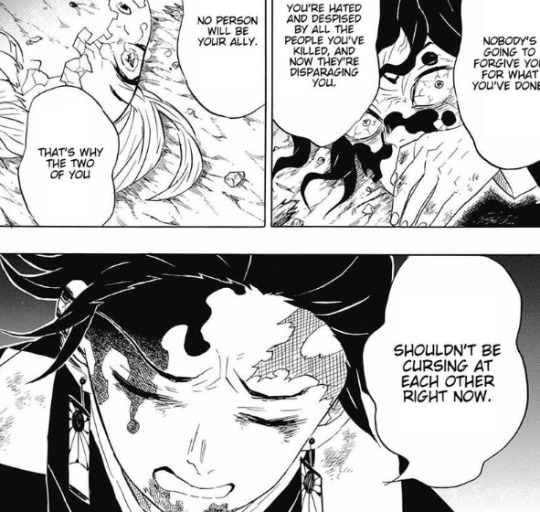
He makes men out of monsters in their final moments. In their final moment he tries to be respectful to their feelings and show them the empathy they were denied in life, saving them in what little way they can. This is exactly in reverse to the way Muzan appears in people’s lives.
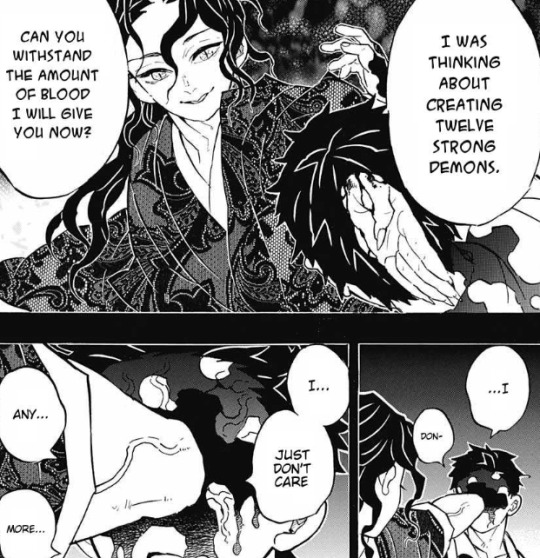
Muzan always shows up at the weakest moments of the people he takes advantage of. He shows up when Kaigaku fell into despair over his inability to surpass his brother, he showed up when Akaza fell into despair after losing everything. Muzan acts the opposite way of Tanjiro. While Tanrjio kills the demons but offers them humanity and empathy in their last fleeting moments of life, Muzan gives them another chance to live but completely strips them of their humanity.
Tanjiro offers empathy and understanding to everyone he meets, Muzan offers it to nobody. You can see it in their reverse reactions to Yoriichi.
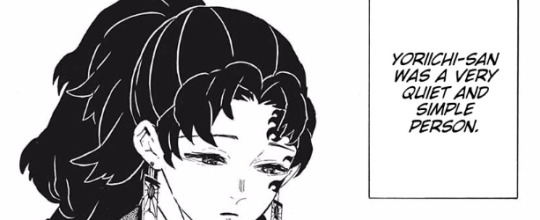
Tanjiro understands that ultimately, Yorichii is a very melancholy person who just wanted to have a family, and a small amount of happiness but was again and again called to fight even though he hated it. He saw the human side behind the genius swordsman that was Yoriichi.
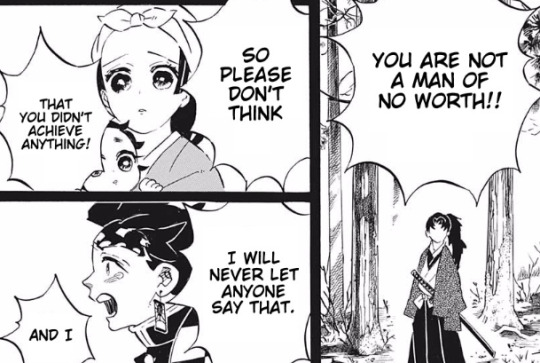
Even though Yorichii failed to protect everything he wanted to protect, his wife and child, his own brother, even though he was expelled from the order of demon slayers Tanjiro wanted to tell him that his life was not a waste. To Tanjiro, every single individual life has worth.

Muzan however, is only able to see Yoriichi as a monster. He only sees Yoriichi for his talent with the sword, breathing techniques, and nothing else. This is how Muzan sees people. He strips them down to their use. He could not care less about Yoriichi’s life story, the person he is. He sees the sword in his hand and nothing more.
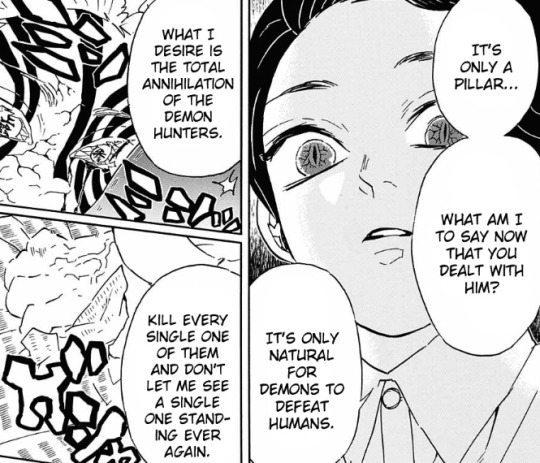

Muzan sees all of the upper moons as existing entirely for his sake. They are tools. He refuses to see them as individuals. He sees them as merely parts of his own body. He gets frustrated when they can’t perfectly carry out his orders. No matter what they do for him he’s never satisfied, because they can’t act truly like tools.
Tanjiro will always see others as individuals with their own feelings and stories, whereas Muzan’s consists entirely of himself. That’s the central difference between them and that leads to the way they perceive themselves.
2. A Man and a Monster
Tanjiro’s greatest priority will always be the lives of other people around him. Muzan’s greatest priority will always be his own life. This is why Tanjiro has to absolutely reject everything about how Muzan is. This confrontation at the beginning of their fight is very telling.

Muzan sees nobody but himself as a person, and Muzan doesn’t even see himself as a person. He equates himself to a force of nature killing indiscrimminately.
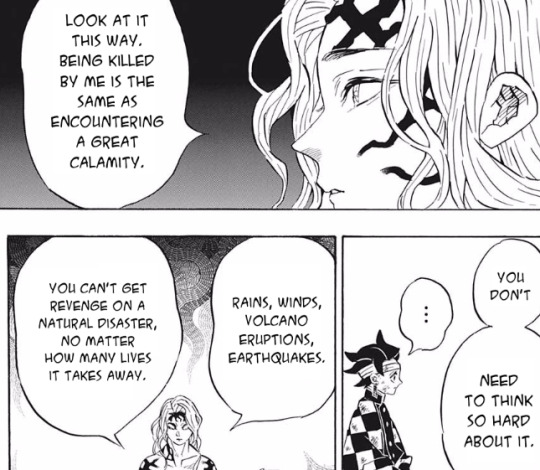
Muzan denies his own humanity and denies the humanity of his victim. It’s important to remember the position these two begin the story at. Muzan is the strongest being in existence. Stronger than even the one who invented all of the breathing techniques. So strong he can instantly regenerate no matter how much damage he takes. Muzan simply doesn’t need to see other people as people. He believes his strength puts him in a position fundamentally higher than him. He seems himself as a mindless force of nature, a being above others, basically a god. He’s the embodiment of might makes right. Fighting against him is pointless because he’s so strong he can trample on whoever he pleases. There’s no need for him to regard the feelings of whoever he’s trampled on.
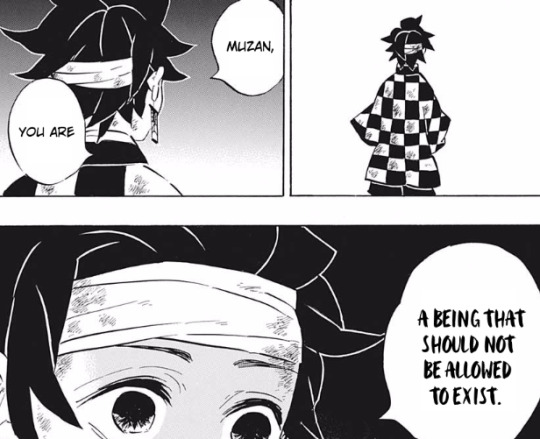
Tanjiro who sees the humanity in everybody has to reject someone who acts completely inhuman. It’s important to look at their arcs and where they both came from as well. Both Muzan and Tanjiro started from places of weakness. Tanjiro since the start of the story has been told that if he’s not strong he doesn’t get to decide anything. He has no rights. He has no choices. That his kindness will only ever be an obstacle to him, a weakness that gets in his way and makes him unnecessarily vulnerable.
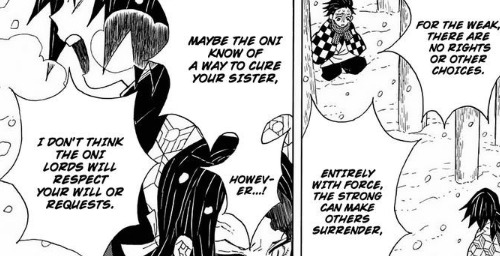
Tanjiro is a character who has to continually fight his own weakness and struggle against it, how useless he is, how he cannot help the people he wants to help. His arc has been finding strength without throwing away his kindness, or his humanity.

Then we see Muzan who made the exact opposite choice of Tanjiro. They both come from similiar circumtsances. Tanjiro is the lone survivor of an attack that killed the rest of his family while he was away, and even if he was there he would have been completely powerless to help them. Muzan is someone who was so sickly he was going to die before he was twenty. They were both weak and had no control over their own fates.
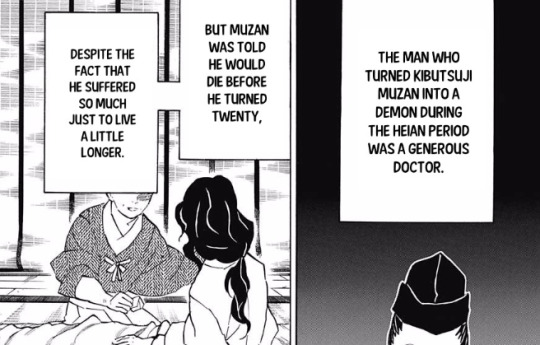
Tanjiro has always blamed himself for his own weakness, whereas Muzan from the start blamed others. His very first action is to kill the man who only tried to help him.


They were both weak and powerless once. However, strength is something that Tanjiroearns slowly, while Muzan is given it on a silver platter. All Muzan had to do was drink a magic medicine and suddenly he was the strongest being on earth. Tanjiro is someone who had to continually struggle against himself in order to go stronger.

Muzan, always, always, always, blames his problems on the other people around him. The key difference between the two characters is how they obtain their agency, that is how they accomplish what they want to do. How they make their choices have meaning. The unfair world states the weak have no choices and no rights, so how do they reclaim both of those for themselves. Muzan gains agency by stealing it away from others.
Muzan thinks he should have the freedom to do whatever, because he lived most of his life sickly and always chained to a bed. His goal is always to preserve his own life at the cost of everybody else’s. That’s why he has absolutely no qualms at all at taking from others.

Tanjiro is someone fundamentally who struggles to give to others. What he wants is to be able to do something that will matter to the others around him. Even their central goals are opposite. Tanjiro wants to return humanity to his sister. He’s spent his entire quest toiling for the survival of someone else to give them their humanity back. Muzan only wants to obtain something for himself that will make his survival more likely. Muzan from the start has only ever been concerned about his own survival, and only cares about continuing his life forever.
That’s why Muzan can’t comprehend someone like Tanrjio, or Yoriichi. He thinks individual strength means that you protect yourself and your own life above everything else. Muzan’s actions are always about continuing his own fragile life, obtaining the perfect immortal body so no one can kill him, and nothing else. However, Yoriichi and Tanjiro are both people who give all of themselves to others. He cannot even begin to comprehend how they fight with no regards to their own lives.
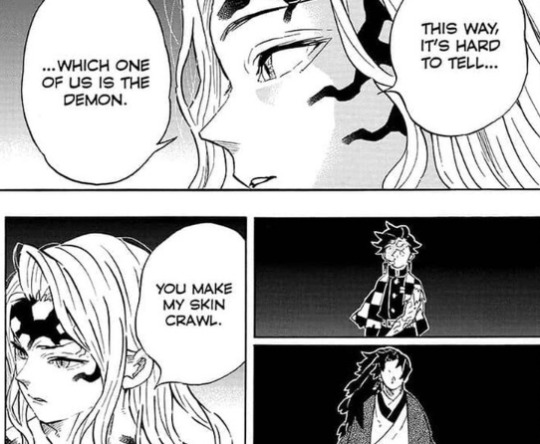
Muzan is someone who lives in constant fear of his own mortality. Despite being the most powerful being on earth, he’s always afraid, he’s always hiding himself, and he’s always alone. He’s a coward ultimately. The only way Muzan can feel safe is if he has the perfect immortal body that can never be hurt or harmed and therefore he will never have to die. Tanjiro however, is someone who keeps on fighting long after Muzan has declared him dead. Not for hismelf but for others. Therefore he is incomprehensible to the demon. It’s extreme selfishness vs extreme selflessness, it’s more about the ideas that each character represents as they clash rather than the characters themselves.
Tanjiro carries heavy themes of existentialism. What gives his existence meaning is what he gives to the other people around him. Because he is able to have connections, even though he’s an individually small and very weak person his life feels like it meant something. Not only that but Tanjiro tries to give meaning to the lives of everybody he meets, no matter how small. He sees even small and weak people as people who’s deaths matter. Even people just quietly living their heads down matter to somebody. Tanjiro also sees himself as a part of the cycle with everybody. He admits that his own life is also small as well but even if he dies, he thinks the people he’s met so far will be able to continue without him. Tanjiro utlimately sees himself as a very normal person but states that normal people just living their lives have worth.
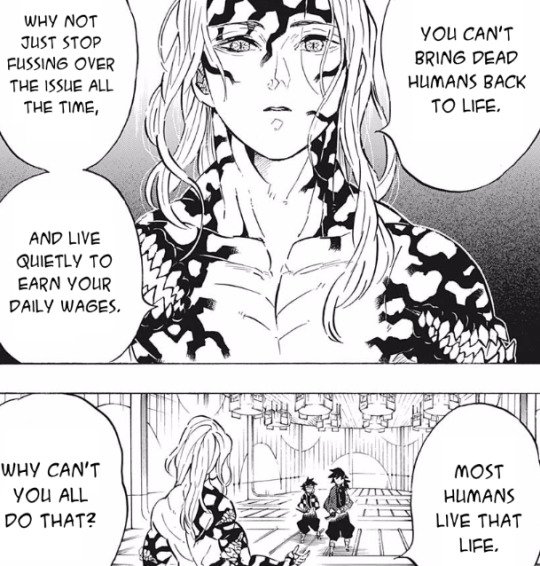
Muzan sees everything as worthless. The demons take a very moral nihilism point of view. This is most embodied in Doma, but Muzan has shades of it too. The people who dead are dead. It ends there. There’s no meaning. Anyone can die at any time so why fuss over it? Tanjiro is trying to give worth to every individual little life he encouters, whereas Muzan is someone who strips away worth from everyone. And once again these are existentialist ideas. What is it that creates meaning in our lives?
Muzan views himself as someone outside of the cycle. He’s a natural disaster. He’s a storm. He’s a special existence outside of everybody else. It’s exactly because he sees himself as special that he sees everything else as worthless in comparison to him.
They also have completely opposite thematic ideas of mortality. Muzan sees death as the opposite of life. The absolute worst thing possible. His entire motivation is to avoid death in any way possible. Whereas, Tanjiro is someone who accepts his own mortality as a part of living. He knows full well that he may die. While he finds death to be a sad thing, rather than be terrified of it and spend his entire life running away from those feelings like Muzan he struggles to find a way to live on carrying the deaths of his comrades, the deaths of his family, and the knowledge that one day he will die because death is a natural part of his life.
This is a theme that repeats itself in the series again and again. The demons extend their lives long past the time they were originally supposed to die, but depsite living for hundreds of lives they live mostly empty lives that amount to nothing more than prolonging their own lives.

Whereas humans who are much weaker, much more fragile, who die much younger than the demons do end up living lives full of other people because they cared about something more than just trying to extend their own lives and live for themselves.

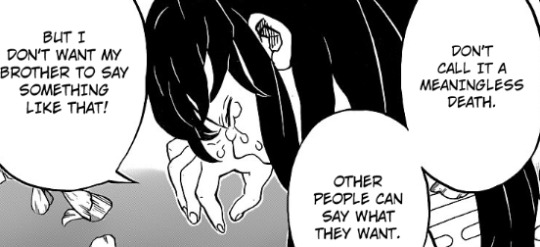
The humans live short tragic lives, but they find a little bit of happiness from that. The demon lives long lives but they ultimately gain nothing from it in the end. Both humans and demons leave meaningless lives, but humans create their own meaning while demons just flaunt the meaninglessness of their own lives. They’re prolonging empty, miserable lives, devoid of all the things that make human life worth living. Muzan isn’t even a person, he’s just a void, there’s nothing in his life but himself. He’s strong but that’s all he is

Muzan is ultimately someone who’s strength does not matter because he only uses it for himself. Despite being the strongest person on earth, he’s undone by simple tricks. He’s defeated by people who are far weaker than him. He’s undone by his own power.

Muzan’s last ditch move to save himself shows him for what he really is inside. He’s not a demon, he’s barely even a person. Because Muzan’s priority is always protecting himself and never letting others in he’s basically reduced to an infant. He’s egocentric like a child. His point of view is the only one that exists in the whole world.
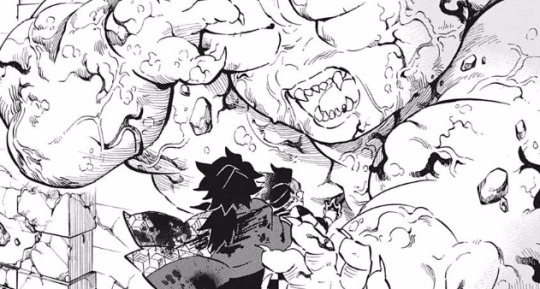
Which is why Muzan dies alone without a single ally in the world. It goes beyond the simple shonen idea of “the villain has no nakama power” Muzan literally doesn’t see other people as people. He’s so fundamentally unable to connect to other people in the way that Tanrjio does that he’s infantile and immature. He’s not a demon just a total failure of a person.
#muzan kibutsuji#tanjiro kamado#kimetsu no yaiba#kny meta#kimetsu no yaiba meta#kimetsu no yaiba theory#kimetsu no yaiba analysis
370 notes
·
View notes
Text
Book #5: The Moral Animal
Flammable undiagrammable sentiments pass between animal beings
Hard to explain but it’s plain that I love you for psychological reasons
- I Love You for Psychological Reasons, They Might Be Giants
I.
The Moral Animal, by Robert Wright (1994), is a book that evokes a wide variety of emotions. It tells you that love and friendship and altruism are real and are written into our collective soul, but that these wonderful things were built to serve ultimately selfish ends.
Put more plainly, The Moral Animal is a book about evolutionary psychology. It explains love, marriage, family, friendship, altruism, and morality as byproducts of natural selection maximizing the inclusive fitness of genes.
If that spooks you, don't worry, Wright has noticed the skulls here. In the early twentieth century, a Darwinian view of human psychology and society ("Social Darwinism") was used to justify poverty and genocide, because those who were poor or sick or a minority were thought simply unfit to survive, and ought to be weeded out by the Benevolent Invisible Hand of Nature.
Wright takes great pains to stress the extent to which this book and Darwinism in general do not support Social Darwinism. He goes over the naturalistic fallacy: that what is true in nature does not tell us what is good or moral. He stresses, again and again, that whatever the "natural state" of humans is, it has little bearing on what our values should be.
That's not to say the influence of evolution is unimportant. We have to understand reality as it is now in order to make it how we want it to be. To the extent that egalitarianism, liberty, and kindness are unnatural, we want to know why and how, so that we can more effectively bring them about.
Even further, Wright finds that evolution created humans to be heavily adaptable to circumstances. In a lot of ways, a belief that evolution built human psychology only increases the relevance of environmental and social interventions to avoid things like crime and poverty.
With all of that said, let's begin.
II.
The book is divided into four sections. The first deals with romance, sex, love, and marriage.
The fundamental insight that this section revolves around is that the optimal reproductive strategy for female organisms (here used to mean "organisms that have egg cells") is different from that of male organisms (here used to mean "organisms that have sperm cells"). This is because of a biological asymmetry between the investment required in offspring production by each sex.
Egg cells require far more investment - in mammals, think of the weeks or months that pregnancy takes. Sperm cells, on the other hand, only need to fertilize an egg cell, a process which might take a male fifteen minutes (or less). As a result, male organisms have way more potential offspring than a female organism.
From an evolutionary perspective, this means that the best strategy for a female organism seeking to maximize its inclusive genetic fitness is to invest many resources in the raising of few offspring. Conversely, the best strategy for a male organism is to create as many offspring as possible.
With this fact in mind, Wright looks at codes of conduct that arose around male and female sexualities. He finds that a variety of cultures came upon similar ideas: that males generally put a lot of effort into having sex with a wide variety of women, and try to avoid commitment to any of them, and that females put a lot of effort into discerning which males will stick around to help raise the offspring. [1]
Wright also puts forth the idea that genetically optimal male jealousy and female jealousy are very different. Male jealousy would be built to avoid spending resources on offspring that are not the male's, and so focus its anger at sexual infidelity. Conversely, female jealousy would be built to avoid the male spending resources on other females and other females' offspring. For this reason, female jealousy would place its ire on emotional infidelity.
Something like this would explain why so many societies place value in young females' virginity. In the past (and in the present) males tended to wield disproportionate political and societal power, and got to decide the rules. So of course they would make rules that are in their own interest, such as "any woman who secretly has sex with another man will be shamed and outcast". [2]
Nothing in the process requires anyone to consciously decide to maximize inclusive fitness; they're just following mental processes which evolved to do that in the ancestral environment of small hunter-gatherer societies. Humans are adaptation-executors, not fitness-maximizers.
But doesn't the existence of monogamy contradict this idea? Why would a bunch of males agree to only reproduce with one female each, when it's in their genetic interest to reproduce with as many as possible?
Wright's answer is that monogamy emerges in less-stratified societies, where rich/high-status men don't have enough power (social or otherwise) to monopolize females. In other words, monogamy is a compromise between men to distribute reproductive opportunity somewhat evenly. In highly unequal societies, males who can do so are more than willing to have as many wives (or female sex partners) as possible, hence polygyny.
Another product of this insight relates to competitiveness. For a male, competition can be the difference between having 1 kid and 10 kids. The difference between maximum and minimum genetic payoff would be smaller for females, due to the larger investment required in each offspring, so we'd expect to see a lower propensity for competition. This isn't to say that they'd have no propensity for competition - females still competed in the ancestral environment - just that the optimal amount of effort to put into competition would be lower for females than for males.
III.
The second part of the book deals with family and friends, and why natural selection would cause us to care about them. The answer for family is "kin selection", and the answer for friends is "reciprocal altruism".
Kin selection makes sense once you realize that evolution works at the level of the gene, not at the level of an individual organism. A gene is naturally selected to favor its survival, not necessarily the survival of the organism carrying it. As long as more copies of the gene get made and propagated in the end, the success of any organism in particular is negotiable.
Because siblings have a high level of genetic similarity to one another, it makes sense for genes to "want" an organisms' siblings to survive and prosper. Thus, we get love between siblings, which causes people to act in ways that increase the chance of siblings surviving and, eventually, reproducing.
This line of logic takes you surprisingly far. Wright examines insect colonies which act like perfect hiveminds, where the good of the group comes before all, and finds that members of these species have an unusually high level of genetic similarity to their siblings. Thus, it benefits genes to encourage acting "selflessly" with respect to individual organisms, because from the gene's perspective, two organisms with the exact same genes are identical. This is why some ants are content to spend their lives literally being a door - if a gene causes one in one hundred copies of the gene to sacrifice itself to let ninety-nine copies of the gene survive, that's a big net gain from the perspective of the gene.
Okay, what about friendship? Why would we form bonds with people who have little or no genetic relationship to us? Because we can benefit from it, of course. Helping other people can cause them to help you in the future. Most people intuitively run something like the "tit for tat" strategy: initially be helpful to others, and then treat them as they treat you. If someone rips you off, you're not going to be inclined to be helpful to them later on. If someone does you a good turn, you feel a need to pay them back somehow. Reciprocal altruism.
In the 1980s, Robert Axelrod ran tournaments simulating iterated prisoner's dilemmas between agents running a variety of different decision algorithms. The "tit for tat" algorithm did the best, indicating that short-term selflessness can easily translate into long-term self-interest.
From this perspective, "friends" are people we have entered into long-term iterated prisoner's dilemmas with. We expect them to cooperate with us, and they expect us to cooperate with them. Because of non-zero-sumness, both friends can expect to gain in the long term even if they lose out on individual choices.
Our genes, Wright proposes, eventually noticed this fact and inclined us to cooperate with others.
IV.
The third part of the book deals with status, signaling, and self-deception.
The previous section on reciprocal altruism elided an important distinction. From the perspective of the gene, the active ingredient in reciprocal altruism isn't actually doing the reciprocating. The important part is making other people think that you will do the reciprocating, and thus convincing them to cooperate with you.
The more expensive cooperating is, and the easier it is to fool other people, the greater the incentive to appear more selfless than we are. As long as other people believe that we are selfless, then they will cooperate with us. This is the evolutionary origin of lying, stretching the truth, embellishment, and so on.
But our genes are in competition with other genes. A gene that lets its host organism get taken advantage of by liars wouldn't do very well. So genes started to evolve mechanisms for lie-detection, and an arms race began between liars and lie-detectors.
What's the most convincing way to lie? To believe what you are saying. Natural selection would have the end result of people preferentially believing things that favor their own interests. In other words, involuntary self-deception. Example: rich people seem to genuinely believe that lower taxes are for the best. Whether or not that's true, it's certainly in their interest to believe it. That makes it easier for them to convince others.
V.
As conceived of by Wright, 'social status' emerged as a shortcut for organisms to avoid costly fights for which the outcome is already known. If A will beat B in a fight and take all of B's food 80% of the time, then it is in both of their interests to skip the actual fight itself and just have B give A 80% of their food. Each party ends up with the same amount of food, on average, but both parties save the time and energy they would have spent fighting. Imagine this process occurring between dozens of individual organisms, all living in the same "community", and a sort of collective "social status" emerges.
Of course, for us humans, social status is much less about physical power and more about social power and access to resources. Despite this, the underlying mechanics remain the same: a brief period of conflict to estimate the "strength" of the other person, and then an assignment of relative "status" that allows both of you to skip the conflict and accept some unequal division of resources. Those resources can be basically anything, as long as it would have helped you in the ancestral environment. From this, we get behaviors such as self-interested groveling to or the domination of others, depending on whether they're above or below you on the totem pole respectively.
You might wonder how this inequality can coexist with the ubiquity of Tit for Tat in human psychology. Isn't Tit for Tat all about fairness? Not exactly. It can still be in the interest of someone (or their genes) to accept a deal where the other party gets 80% of the payoff and they get only 20%, as long as that 20% is better than whatever they would get otherwise. If engaging in conflict risks long term injury or death or permanent consignment to a low caste, then that safe 20% starts to look pretty good.
And if status is so important, we should have a lot of mental machinery put into acquiring it. As Wright puts it, the main purpose of friendship is mutual aid in status competitions. This makes a surprising amount of sense: think about common story tropes. What could be more villainous than a street rat who, after years of living hand-to-mouth with his tight-knit gang, gets a lucky break into the upper class, only to forget about and forsake his companions?
From natural selection's point of view, we would want to discourage that kind of behavior as much as possible. Dante put traitors in the deepest layer of hell. We want maximum trustworthiness (from others) in iterated prisoner's dilemmas.
This is where moralism comes from. Our vocal cries about treachery, our indignation, is a social signal to others that "hey, we can be trusted not to defect, we hate defectors, come cooperate with us!"
And of course, things we say are more convincing if we really believe them. This is how the moral animal came to be. The animal who sacrifices itself for others, who holds honesty and selflessness in the highest esteem, who always seeks (or appears to seek) their own betterment only to serve the common cause of humanity.
V.
After internalizing the book's thesis, not being an evil sexist-racist-whateverist Social Darwinist almost seems like the easy part.
I mean, how do you live your life knowing that the things you care about the most, each grimace and muttered curse under your breath, your own most intricate and private agonies, were all crafted for the primary purpose of getting you to acquire social status and resources to further the interests of your genes? What the fuck do you do with that?
…
The final section of the book is about morality. What it means, what it can mean, to be "moral" in light of all this.
Wright's answer, like Darwin's, is simple: happiness is good, pain is bad. Whatever trickery is going on behind the scenes of our minds, this basic insight remains.
Yes, we only came to care about morality because of genetic self-interest. But we actually do care about it. We can come to reflective equilibrium regarding our "implicit values," and pursue whatever values that reflection produces. The only other options are explicitly pursuing natural selection's values (an evil idea if there ever was one) or total nihilism. Taken to its logical conclusion, the happiness-good-pain-bad principle implies something like all-consuming egalitarian utilitarianism. Universal love as preached by Jesus, Buddha, and cactus people.
This runs contrary to the traditional notion of retributive Justice - people who commit horrific crimes ought to be punished, right?
Sort of. This inherent value of justice evolved because it generates game theoretical deterrence of non-optimal behavior, but individuals often pursue Justice past the point of rationality into senseless cruelty. Wright says we ought to focus on the empirical reality of deterring and preventing crime, over our moral notions of "retribution."
VI.
The last pages of the book deal with determinism and its consequences. Not just genetic determinism, as you might think, but all determinism. As Wright puts it, whether it is our genes or our childhood or our socioeconomic conditions or random noise or some combination of it all that decides our actions, the end result is the same: very little of our good or bad actions can be attributed to "free will" with a straight face.
If a murderer's rage, a cheater's urges, and a thief's greed are all understood to be mechanical outcomes resulting from biochemistry and game theory, then surely we should not judge those people. We ought to pity them as victims of their circumstances, and work to create a society where those circumstances come about less often.
...but there's a problem. "Creating a society where those circumstances come about less often" involves judging people! The whole point of this book is that we're often subconsciously checking to see what we can get away with, how harshly we will be judged for acting selfishly in certain ways. So if we actually took Wright's initial advice, and avoided social judgement of others, and cooperated with everyone all of the time, then we'd get a bunch of stealing and cheating and everything would be terrible.
So we have to continue to socially sanction people, to muster up anger and indignation for game-theoretic reasons, while also knowing that empirically, they're about as morally responsible for what they're doing as a boulder is for rolling down a hill. Wright realizes the magnitude of this challenge, but he has no silver bullet to overcome it.
I'm not any more sure about the question than Wright was, but I think efforts to teach everyone about the game theory behind our intuitions about the "morality" are a major step in the right direction.
I can't find it now, but I remember a few years ago, there was a website that had a whole interactive set up which let you see for yourself how tit-for-tat and cooperation can be in everyone's best interests, even selfish individuals. Perhaps enough projects like that, over the course of a couple generations, can craft us a "public conscience" which is as merciful as it can afford to be, but no more, and as Just as it needs to be, but no more.
For our sake, I hope so.
VII.
Here's a collection of random related thoughts and facts.
-Is being an effective altruist who values all humans equally an escape from the selfishness of genes? Maybe not. The relevant equation for "organism-level altruism" of a gene is C vs B * R: cost of altruism to the organism giving it versus benefit times the genetic relatedness of the organism receiving it.
The point of effective altruism is that you can get way, way more B for a lower C, if you direct your attention far away. And this definitely lowers R - I'm barely related to some random person in Japan or India or Mozambique. But R is not zero. In fact, all humans share a ton of genes.
So perhaps effective altruism isn't an escape from the genetic-self-interest calculation behind altruism - it's just an unusual way of maximizing it.
-Darwin spent several years being really into barnacles.
-A big prediction of this book is that people learn fast/slow life strategies based on their early developmental environments, but this recent study finds evidence against that.
Relatedly, my general "feeling" about this book is high confidence in the importance of a Darwinian perspective on psychology, paired with a deep skepticism of psych studies in general, especially mid-twentieth century ones. I'm concerned this puts me in the hypocritical position of "thinking this stuff is correct and important while not strongly supporting any particular predictions it makes," but I don't have anything better.
Footnotes
[1] If true, all of this would predict that males (AMAB people) would tend to have a lower level of "romanticism" (because romanticism was less often in their interest), and that females (AFAB people) would tend to have a lower level of sexual desire (because frequent sex was less often in their interest). And recently identities like "asexual" and "aromantic" have become more popular. Do we see the expected trend?
According to the abstract of this paywalled paper which was the first google result I found, the asexual identity was more common among non-men (predicted by this theory), although there wasn't a significant difference in reported romanticism (not predicted by this theory). Perhaps people who are nonstandard enough to know about and decide to use those labels are nonstandard in other ways, so this isn't rock solid evidence of anything.
[2] In reality, the chain of logic is a bit more complicated. In full, it is: Males who acted according to a certain form of "male jealousy" would be more reproductively successful, and so this jealousy becomes widespread in humans. Then, males who have social power would want to enforce rules that conform to their beliefs in the injustice/immorality of female infidelity.
Even more precisely, it's not that "jealousy" evolved due to "jealousy genes". It's really "genes would spread if they tended to build brains with mental architecture that tended to develop specific kinds of jealousy". (This level of imprecision and variability is one reason that Darwinism is not nearly as morally threatening as you might expect; general trends leave a lot of room for individuals to vary.)
0 notes